#only with the illusion of my empathetic nature
Explore tagged Tumblr posts
Note
All these Gale caring posts are getting to me
What about a tav who suffers from chronic pain, and a bit depressed to not be able to do things she used to be able to do? 🥹
I would feel that with Gale experiencing chronic pain from the orb, he would especially empathize with a tav who suffers from chronic pain. How would he comfort/share his care with such a tav?
VERY specific and very self-indulgent but all your Gale care posts have been so warm and spot-on 🥹💜✨️
Regarding all the caretaking asks which have been SO delightful, I feel I must share this quote:
“It is a truth universally acknowledged, that all Galemancers are stans for caretaker Gale.” - Jane Austen
(OK, yes, I may be misquoting that slightly, but I’m also 109% sure Austen would’ve been a Galemancer, so it’s all good.)
OP, you could not have chosen a better, more loving, more understanding, or more empathetic caretaker for a Tav with chronic pain than Gale, ‘his-orb-might-have-been-removed-but-his-knees-are-still-aching-terribly’, Dekarios.
After all, when Gale was at his lowest and most vulnerable point, suffering constantly from the orb’s side effects, Tav was his caretaker. Tav, who sought out and gave him the magical items needed to ease his pain. Tav, who checked in on him often, asking if he was in need of anything. Tav, who never made him feel like a burden.
Tav, whose kindness and care made Gale fall in love with them.
So when I tell you that Gale intends to pay it back 1000x, I am not exaggerating.
He understands the importance of letting Tav keep their independence—especially when Tav specifically laments things they used to be able to do—while providing them with any support they need. He never crosses the line by assuming he knows what’s best for Tav; he always asks how they are feeling, and is a patient, attentive listener.
He also never frames their situation as anything bad or negative. When Tav wakes every morning, whether it’s to the relief of a manageable ache, or the dread of a harsh pain settling in, they know that in the next instant they’ll feel Gale’s hand on their cheek, his kiss on their forehead, and his soft voice asking, “Good morning, my love. What adventure are we going on today?”
Tav’s answer might be they’re feeling well enough to go exploring around Waterdeep, or it might be that they can already feel pain clouding their thoughts, exhaustion overtaking them, and they want to stay in. Gale’s loving smile never wavers. If it’s a day he’s scheduled to teach at the Academy, he’ll simply ask if Tav wants company or no? Tara is always available, or Gale’s simulacrum. Or Gale himself will stay home if Tav prefers; in that case, he will simply send his Simulacrum off to teach in his stead (the students love it when this happens, btw.)
And Gale’s mastery of magic truly helps when Tav is feeling regretful or upset. He can conjure almost any illusion, after all, and so if Tav longs to visit an environment that they know they would struggle with given their condition? He will conjure it for them (and he will tell them, most sincerely, that ‘my knees thank you, my love, for not making us partake in this journey and instead allowing an illusion to suffice.’)
The only aspect Gale struggles with is coming to terms with the fact that, for all his skills, there are some things he cannot do; and curing Tav of their pain completely is one of them. But he will do his utmost to ease their pain in any way that he can.
And if Tav finds themselves feeling upset or guilty or frustrated, as is natural once in awhile? If they try to tell Gale they are sorry, as this was not the life of exploration and freedom they had envisioned for themselves or him?
Gale will gently place his hands on their shoulders, and look them in the eye. “My love, I’ve had my fill of exploration. I have already visited every inch of Faerun while I was stuck here in my confinement. And though I was able to conjure any place, any experience I wanted, it did nothing to cure my loneliness. Because I couldn’t conjure you.”
Then he’ll take their hand in his, and place it over his heart, and smile so sincerely that Tav will know he speaks the truth.
“Having you with me, in our home, is the only adventure I will ever desire.”
#OP I sincerely hope your condition improves#Wishing you nothing but wonderful and pain-free days ahead 💜#gale dekarios#gale of waterdeep#baldur's gate 3#bg3#gale x tav
126 notes
·
View notes
Text

NEW OC JUST DROPPED GUYS LOOK
—
Ok, so I don't even know how the idea even came into my head in the first place, but they have been using up every single one of my braincells since it did.
—
Basic Information:
Their name is Prism and their AU was destroyed a very long time ago. It’s because of this that hardly anyone knows its name
Their pronouns are primarily they/them, but he/him is acceptable
They’re over 100 years old, but they stopped actually keeping count a while ago so the exact number can only be found through a CHECK
Abilities:
Light creation
Light manipulation (illusions/lasers/brightness)
Bone attacks
Very weak blue magic (can hardly lift a person)
Transportation magic (teleportation/portals)
Some personality traits:
Introvert (ex. Avoids people)
Anxious (ex. Overthinks things)
Empathetic (ex. Easily understands others’ emotions)
Reckless (ex. Doesn’t always think things through)
Sneaky (ex. Good at hiding true intentions)
Other:
Their magic drains quicker in darker environments and slower in brighter
Stats and magic potency isn’t affected
The canisters on their belt are pretty much just flashbombs
They’re magic boosters and healers for Prism
They’re very socially awkward and avoid contact with AU residents
They spend their time going between the AUs that Nightmare attacked and helping to restore light. As they work and as more light is produced, Positivity is created as a byproduct. Think of those happy lights you can buy: you use them in the winter when there isn’t much natural light outside and the light produced by the lamp is supposed to make your mood better. Again, Prism has no direct hand in the creation of Positivity, it’s just made as a byproduct to their work.
Their soul is kinda just a glowy orb???
—
THERE WE GO!!
The post deleted once I was almost done so I had to redo it ;-;
Also this is just basic info, there’ll probably be more later :)
If you have any questions, please ask them!!! I’d love to talk about them more! :)
#don’t repost#my art#taco talks#art#taco art#taco oc#prism#prism!sans#prism sans#NEW OC THAT ISN’T A SHIP CHILD#WHOOOOOOOOOOO#they’re so cool#please ask me about them!!!!#even ‘weird’ questions#it’ll help me shape their character more#:))))))))
20 notes
·
View notes
Note
on the note of the other ask which I again forgot to put my little tag at the end about the blasters taking certain traits from their owners/masters.
So I wanted to ask what you think about characters getting different magics. For example with Sanses i just feel like magic is suppose to be an extention of ones self it kinda feels like even with different personalities, different lives, literally not even being Sans anymore their magic is always the same the only ones who get any differences are the gods.
Like imagine Killer magic shifting to something like shadows since its the kinda magic I always imagine something new Chara would have if they gained magic, or like something to do with eyes and illusions.
I like to think in a situation of the mad time trio joining Nightmare who isn't completely evil their magic would shift over time to resemble something like his even if not the same I like to think all three would gain magic that has to do with illusions. Horror would be auditory leading you into a trap a lamb to slaughter which to me fits his personality in Horrortale laying traps rather then exhausting himself with a chase thats more Killer thing. Dust would probably have to do with you visions projecting things that aren't real and working with Horror to create the imagine and sound of someone they know. Finally, Killer would probably pray more on emotions it is said that bloodlust is the purest form of an illusion so I imagine Killer projecting some kind of emotion from his soul amplifying it to twist their emotions more.
Which it feels like in the fandok the only ones who can have any magic concerning emotions are Nightmare or its like your stepping out of bounds and stuff. Like in my personal opinion I imagine Killer also being empathetic mainly because his soul is always out its picking up on emotions and intent in the air from the people around him. I can also see many Papyruses having empathetic abilities it just fits them.
For the Bad Sanses I imagine Nightmare magic would concern Darkness, and Nature. Killer would be Shadows, and Storms. Dust is Fire and Ash. Horror is Ice and Earth. Finally, Cross is Water and Light. [Cross gives off paladin vibes].
Nightmare is an ever growing seed in darkness hidden from view. Killer never stops his movement the moments of calm only lead up to something more. Dust burns hard and fast an ever burning ember refusing to be snuffed out. Horror is steadfast and cold an unmoving object. Cross is ever changing flowing and refracted by someone else.
No one ever talks about Horror ability to control other peoples bones and effectively implode them. Like why can't other characters get cool magic without it not being allowed both Dust and Killer authors are more loose in what's allowed besides Dust being able to copy people magic which isn't Canon but like developing new powers because they have changed so their magic reflects that would be cool.
What are some unique powers you would give to like the bad sanses and chromatic crew?? Also sorry for long yap 😶
Also after I finish dishes do you wanna play some minecraft???
Imma just put little tag at the end first and then start yapping
~Musical Anon
I personally always thought that Stage 2, if he developed empathy, would be more along the lines of cognitive empathy than emotional empathy.
How he uses this, if he actually cares at all about this knowledge, depends on how ya want a story to go or how you want him to develop I suppose.
As for everyone else developing and changing magic, i think it could be cool if it’s done well.
I’m not feeling very creative rn, but I do remember d3lta anon headcanoning more powers for Delta/Beta in that they’d turn orange and stuff with fire powers. Can’t remember the entire ask but delta has been associated with fire.
And of course Color would probably be associated with fire too—and also he can already pretty much heal a lot—but I’ve also seen things like with light or color manipulation. I remember coming across a whole Wikipedia detailing a list of powers color doesn’t actually have (but presented as if he did have them) but would be cool.
#howlsasks#musical anon#utmv#sans au#sans aus#utmv fandom#killer sans#killer!sans#bad sans gang#bad sanses#nightmares gang#nightmare’s gang#murder time trio#dust sans#murder sans#cross sans#horror sans#horror!sans#dust!sans#murder!sans#cross!sans#epic sanses
16 notes
·
View notes
Note
Any extra little facts you’d like to share about KOW? Any references you hadn’t see people mention or details you’re really proud of?
OOOOH BOY LETS GO!
YOU’VE UNLEASHED MY DESIRE TO GUSH OVER COOL STUFF IN MY STORY!!!
1. The Seven Teens Each Represent a Planet in The Solar System
Okay so this wasn’t planned initially but it was an AWESOME coincidence that I realized thanks to @uva124 making an association with Asha’s personality and the symbolism behind Saturn
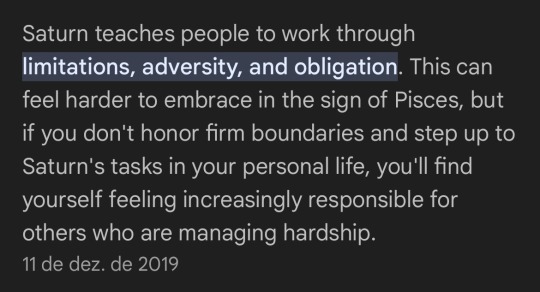
Asha is someone who perseveres through adversity.
All planets have symbolisms like these, and some of them fit surprisingly well with the other 7 teens, allow me to show you:
Dahlia- Jupiter
Jupiter: Known as the planet of wisdom and expansion, Jupiter's influence extends to leadership potential and visionary thinking. A favourable Jupiter placement in the birth chart signifies optimism, generosity, and a broad-minded approach to leadership.
Dahlia is the leader of the group, besides Asha.
Gabo- Mars
This planet shares its name with the Roman god of war, so it's all about aggression, survival, and animal instinct. On the positive side, Mars helps us take action and act assertively. On the negative side, Mars can lead us into impulsive behavior.
Gabo is the most aggressive
Simon- Pluto
On the lighter side, Pluto is associated with renewal and rebirth. It represents endings and new beginnings, as well as spiritual growth and rebirth. Negative expression of Pluto is an obsessive desire for power and control and general destructiveness. A positive expression is the ability and desire to transform.
Simon went through a transformation through the story as he learned to trust himself and his friends more, and let go of his loyalty to the king. Also Pluto is no longer considered a planet, he’s the odd one out, the same way Simon is the only one who gave away his wish
Bazeema- Venus
The planet of love, romance, money, beauty, and art, your natal Venus speaks to the way you express your desires, your passions, what you value, and how you relate to and experience pleasure. It also influences how you socialize, relate to, and attract others.
This one is more so how Bazeema is very pretty and feminine in nature
Hal- Mercury
Mercury represents the principles of communication, mentality, thinking patterns, rationality/reasoning, adaptability and variability.
Hal is the one who encouraged Aster to communicate his feelings to Asha, also when they’re all getting to the castle with flying objects Asha drew, Hal was using shoes with wings on them, like Hermes, the God that represents Mercury… THAT REFERENCE IS A COINCIDENCE AS I ONLY HAD THIS IDEA TO REPRESENT EACH ONE OF THEM AS PLANETS AFTER WRITING THE WHOLE STORY LIKE- HOW?!?
Dario- Neptune
In astrology, Neptune is associated with the collective consciousness, idealism, dreams/fantasy, projections, undoing/dissolution of the status quo, evolutions, artistry, empathy, and illusion/confusion/vagueness on the way to discovering universal truths.
Dario is the most empathetic of the group and shows through his physical contact, although sometimes he can be a bit confused on what’s going on
Safi- Uranus
Uranus, the planet of sudden and unexpected changes, rules freedom and originality. In society, it rules radical ideas and people, as well as revolutionary events that upset established structures.
Safi was the one who figured out the King’s weakness was his staff, he pretty tilted the odds in their favor, giving a flame of hope to their revolution… Also he’s always sneezing like he has a cold, and Uranus is the coldest planet in the solar system so I think that’s funny.
All of this plus Asha representing Saturn gives us a pretty neat connection to astrology in this story that is ALL ABOUT astrology, stars and stuff.
Magnifico represents the sun and Amaya represents the moon, as it’s hinted in their designs by @uva124
So expect when we start designing the 7 teens they’ll have some hints to the planets they’re connected with, subtle hints of course, which will make designing them all the more fun!
2. Aster Little Catchphrase Before He Sings
So that was an idea I had since early on when writing KOW, I wanted to imply the best way Aster can express himself is through music, which builds up to At All Cost where, to me at least, the lyrics feel like someone trying their best to express their feelings but not quite sure how to, so the words and emotions all come out in a beautiful mess that is those lyrics
Now, the phrase he said in my first draft (that y’all read here on Tumblr) was “So I’ll try to explain in the best way I know how” but that phrase always felt weird to me, so in Ao3 recently I edited it to “I’ll explain my own way” WHICH FLOWS OFF THE TONGUE SO MUCH BETTER HOW DID I NOT THINK OF THIS BEFORE???
And it fits Aster so much better since their whole thing is that the stars doubt him, but he still believes in himself and tries to grant Asha’s wish his own way! Like come on it just WORKS!
3. References I like but not sure everyone caught
Asha in the very beginning mentioned she dreamed with a someone made of light, so one could say they… Met once upon a dream ;)
Asha running down the long stairs of the palace after learning the royals secrets gives me major Cinderella running at the strike of midnight vibes, I’m disappointed in myself for not making her lose her shoe mid running then coming back to pick it up
Asha referred to her mom as a fairy when she was little, and her mom had a cloak similar to the fairy godmother, which I think it makes the reference of the cloak cuter in my opinion
There’s a scene Amaya and Mag are having a discussion and she’s talking to him while looking at herself in the mirror, she’s looking at him THROUGH the mirror, get it??? THE EVIL QUEEN AND THE MIRROR! No need to literally turn him into the magic mirror to make that reference
And these are the ones I didn’t explicitly point out that I can remember from the top of my head, honestly wish there were more
26 notes
·
View notes
Text
Edge of Tomorrow: A Film Review
I've gotten a few positive comments on a casual review I wrote for the 2014 Doug Liman x Tom Cruise vehicle: EDGE OF TOMORROW and figured it'd be fun to share my thoughts here! Review: vvvvvvvvvvvvvvvvvvv
Phenomenal and deeply Randian - a compelling visual treatise on why certain individuals - say, Übermensch - are being held back by the limiting nature of hierarchy and beaurocracy when they could be achieving greatness through physical conditioning via extreme circumstance. This is the framework of all great classic American™ actioners of the era of the mainstreaming of Objectivist infused American Libertarianism (1960's - now) that posit a hero who must defy his superiors (be they material: "boss" or ideal: "rule of law"). Edge of Tomorrow extends this framework to time itself, in which the Übermensch heroes of Thomas Cruise Mapother IV and Emily Blunt are both existent outside of the ideological constraint of "history" and are thus able to dominate and change it.
It is somewhat interesting, the power fantasy of failure into greatness, with the meta understanding that the material is illusion beyond its existence as a challenge; that is to say, the power fantasy of always being able to "try again." This fantasy has it's appeal as can be seen extensively in, essentially most if not all, video games which are only differentiated from one another by the contents within which are designed for the player(s) to overcome. This is fundamental to any videogame where you can die or get a game over screen or are sent back to the beginning or moments before your fatal error is made. To reiterate: the fantasy of being able to always try again is a popular one, infused with a lot of familiar media. I mentioned Objectivist infused American Libertarianism specifically because the ideology of Edge of Tomorrow, when Tom Cruise reaches the zenith of his experience and is faced, ultimately, with a choice, he chooses (as if this could ever be a spoiler for a Tom Cruise action vehicle) humanity over himself. He understands that his happiness lies with the happiness of humankind, and rejects one of the most selfish, hateful aspects of that antagonistic, thoughtless ideology of Objectivism. This veers the film in a new direction, but this new evolution of philosophy is ambiguous. What is humanity that we must sacrifice ourselves for? Is this a fascistic moral or an empathetic one? It hard to answer. Should one give her life to save the lives of many? The ideologically militant often agree with this idea, to the extent that it is the often framed as the hallmark sign of one who has become "militant" in belief. What saves Edge of Tomorrow from having to answer this question is it's own medium: entertainment. Or this is what muddies the waters further. I will step back from this debate for the moment.
So, one of the main changes from the light novel ("All You Need Is Kill" - Hiroshi Sakurazaka) is that Cruise's protagonist is no longer a fresh recruit but the face of the propaganda arm of the international "earth" military coalition* The only way he is able to get as far as he does in the narrative is through his skills as a negotiator and public speaker. He is held back by three things: his own flaws in personality, his physical prowess, and the overwhelming, amorphous might of fascistic, militarized government. As time passes, and as he dies, he is able to convince people more and more of his preferred outcome. He does not improve at speech craft but instead changes as a person, and utilizes his tools of speech craft to better communicate. He finds that people submit to strong authority, not uniform and ideal of authority, but this Übermensch behavior of "taking charge, properly utilizing violence, and applying a firm, paternalistic guidance (utilized by Cruise in the later Mission Impossible titles) to get what you want." They do not respect Tom Cruise the Weasel but Tom Cruise the Commandant, the "Great Hero" and fall in line. Cruise can only utilize his powers of speech as well as he does because of his innate capacity for it and thus the writers adapting the story for english audiences have changed Cruise's occupation from fresh recruit, to chief propagandist. The system is corrupt (as I will discuss shortly) but the individuals in positions of power have achieved their positions fairly and on merit. The myth of the meritocratic nature of fascist governments is one I personally recognize as being believed by American Libertarian individuals who find heroes in their own military or heroic figures in the old armies of the terror regimes of the pre-neoliberalism era (those brave designers of German Tanks, Nazi 'Super-Weapons... Japanese Zeroes... Gee, those Nazis sure were evil but doggone it they had fashion! I love Albert Speer's architecture! I pledge allegiance to Wernher Von Braun and his darling Apollo Saturn V rockets!). The "indomitable human spirit" which is itself defined by its capacity for productive contribution, is spiritually too powerful to be hindered by the confines of beaurocracy and "ethics" and "ideological commitment." Again it must be stressed that although all humans possess the "indomitable spirit" only the Übermensch may be allowed to tap into it during times of extreme crisis, so as to guide the rest of humanity and allow us feeble mortals to achieve our own personal, lesser happiness. Why else then would Emily Blunts character be the greatest fighter in the earth military? Even with its flaws, the best fighter is still the best fighter and, as the movie itself says at the beginning - Imagine an army of Rita Vrataski's - Imagine a world where everyone is the best... it's a shame, the movie says, that only a select few people actually are. Why else would Tom Cruise be relegated from an everyman role into a position of power and prestige? Why individualize him beyond his evolving response to the extreme circumstances he is put under? Again this is open ended. Maybe he is the coward propagandist because he is a special individual set apart from the rest OR he is someone we are trained not to like; a faker, a selfish coward, a.... valor thief? Hm.... I'd say it's a mixture of both. Either way we are meant to dislike him, only to find his "true" spirit when presented and molded by extreme circumstance. "Hard times create strong men", etc...
Let's discuss the state of Earth in Edge of Tomorrow. The aliens have invaded several times and humanity has lost... Germany? Uh oh. In response, the governments of Earth have formed the United Defense Force. The UDF employs a branch dedicated entirely to media appearance - the army itself has a propaganda machine. Tom Cruise is arrested (probably for good reason) but is not given a fair trial and is, essentially, lined up for execution. His execution will come with his deployment as a part of the first wave of troops against the alien invasion. The army leadership knows it is sending in its first wave to die, or at least knows that the ground troops are expendable and thus dehumanize their own citizens. Commanding officers are allowed to torment their respective charges and can refuse to teach privates crucial skills for survival as punishment. The CO that Cruise tries to reason with says he is not American but is "from Kentucky," thus referring, or becoming relatable to, the American Libertarian "states rights" demographic. In any case, this both endears us to the CO and alienates him further from Cruise - which elicits both endearment and anxiety in the audience. The advanced technology used by the military is both meant to impress (see: film poster) and reveal the failure of fascist beaurocracy: the guns jam, design flaws make the suits somewhat dangerous, the main scientist character is himself an outcast because his superiors didn't understand his "radical technological theories," etc. Cruise ultimately always abandons the exosuit. Rita Vrataski is never believed when she was a part of the loop and thus the "greatest fighter against the aliens" is relegated to the front lines and marketing material. It is no wonder that Cruise and Blunt have to reject this corrupt system and "do things their own way."
The film tries to tie itself to Starship Troopers by opening on marketing material meant to hype up the war effort: the ads and news reports themselves feel like something out of Metal Gear solid and give the impression that we will be watching a fun, "popcorn," satire. It's hard for me not to see this as the dumb guy's interpretation of Verhoeven's "Troopers" but with a such a clearheaded interpretative vision (aside from what I feel are a couple of missteps) that it becomes an articulate dumb guys idea of Starship Troopers' something more in line with the Heinlein original than Verhoeven and Neumeier's adaptation. The articulation, the "clearheaded-ness" that I talk about helps create a refreshing picture. It is, in a weird way, nice to see something with such a recognizable language that seems to understand what it is preaching without "overtly" preaching it and thus remaining "entertainment." Edge of Tomorrow is the "preferred" dumb actioner, superior to other narratives within the same vein critically. It is looked back on fondly. "Those so and so movies are so old hat... but I loved Edge of Tomorrow! It's better than Cruises other action junk lately! (Jack Reacher, Oblivion, The Mummy... Knight and Day????)" It makes a compelling argument for self-sacrifice and discipline and individuality. It is good propaganda, entertaining even, and I wonder if that is what people are drawn to in the USAmerican canon of Action Masterpieces. A lot of fun... but watch out! Its ideology is actually kinda dogshit! I think Hayao Miyazaki would like this movie in a bad way. 👍👍
*(which is itself headed by one of the 5-6 Irishmen that you've heard of in the acting world that you know is Irish, Brendan Gleeson.... I can presume his character lore is that he was a part of the Northern Ireland occupation force before being promoted to head a military operation on foreign (non-British) soil or else the British ex-Empire has totally and utterly collapsed in the face of the slow alien invasion because there is no way they'd let an ol' Irish fella be in charge of an operation this big unless he got trained on shooting rubber bullets at his neighbors.)
#edge of tomorrow#tom cruise#doug liman#movies#film review#movie film picture kino cinema uhmmmm ermmmm moube?
2 notes
·
View notes
Text
◜ ₊ — 𝓡 ˚ ₊ ❛ 𝐅𝐈𝐑𝐒𝐓 𝐒𝐓𝐎𝐍𝐄.
When he arrives he sits, and when he sits his chair becomes his throne.
The irreverent perch of his elbow over the armrest claims ownership, his pale fingertips touch coolly to his temple with an intense flick of ruby eyes toward the interviewer. With these arresting motions his intimidating presence bears volume per intention, or per nature. It was all just as well. No longer disguised in Nil’s timidity, the minor prince of Gradlon- the once misguided successor of Sombron- can show himself for who he is and there are no secrets that he intends to hide.
Not this time.
Now, the unmaker of one world has come to the doorstep of another, garbed in his newfound power; so thickly intertwined with it there were few illusions toward the strength lurking in his body even when it was at rest. Tucked beneath his clothes, the dragonstone hung on a cord emanates with miasmic energy across his thin, scarred chest. Everyday humans were sensitive to supernatural sensors as the one before him went to prove, with a silence that dragged on several mites overlong.
Rafal closed his eyes with impatience at the admission officer’s fidgeting, his too-loud pen scratching in the midst of some nervous tic or another. Seeing this display, the empathetic Nil would have kindly addressed their fears- the ideal of him that he remembers, anyways. However, Nil is the petals and Rafal the thorns, though borne from the same stalk, it is nevertheless the sharper things that prevail; the living ones.
For a thousand years now he has not taken the name or personality of that long-dead friend, that kindly younger brother. Which is all to say, there is no need to engage in the farce of kindness any longer. So he summons for the man’s noise, commands it, without so much as a sliver of a glance in his direction.
“...You’re to gain a better read of my character, are you not? Then begin your work at once. I am here for neither chatter nor silence. You will find me a less pleasant man when subject to either of these things.”
The effect is amusingly quick, an undelayed correlation between human fear and a force to fear. Rafal hides his pleasure in a smirk. “O-Of course! Ahem. Right away then, Lord Rafal…” the interviewer all but yelps, straightening, then at last stuttering his first question into the air.
“Well, then! Erm. W-What has led you to where you are today?”
At last. He opens his eyes. Where others might waver before the conundrum of how or where to begin a long tale, his own initiation is expressed with something akin to confidence. Not that his words were rehearsed, not that it was a tale he loved specially to recount to others, but that there was simply no other way to start.
“The life of a weakling, I suppose,” his low drawl then rumbles, prideful and self-deprecating all at once. In that contradiction is only his honesty. Rafal honors no sense of mystery toward his past, if he lies the truth will present itself regardless, and neither his wicked sins nor his ignoble beginnings are worth hiding.
“...Though, I don’t expect people to understand it.”
There was no search for pity in the statement his neutral gaze expressed. It was tied only to a crime weightier than any murderer or tyrant could know- the undeniable fact that Rafal was responsible for a world that sat in so many shattered pieces. For the ocean of its graves, the barren fields and the crushed flowers that would never again bloom, the tears wept by its estranged people left without rulers and without hope.
Such faults could not be excused in this lifetime, even if the effects of a cruel and desolate world had already been veritably experienced, well, elsewhere:
“Sombron prized ability beyond any other ideal. If his children were not strong- if they could not transform, or they had no talent to call their own- they were not useful. If they were not useful, they were judged failures. Defects to be culled, whose empty spaces would be filled and easily replaced in turn. Such was his way. Our way.”
So often did Rafal see this reality. He had very well nearly lived it, after all, if not for the strange twist of fate that handed to him an ability, a livelihood and lifeline, to awaken the emblems dwelling in seven bracelets equal and opposite to a sister who was not his full-blooded twin.
His tale continues without missing a beat. “In the unfortunate circumstances of my existence- weakness greater than most others of my kind- I concealed my only talent and sought to rectify my miseries. I was successful. Power, though it came at the great cost of a world, and nearly a sister, is now mine.”
Two great costs that could be deemed regrettable, in the end, but it is not the attainment of power itself that he regrets.
If there had been another way to achieve his ends, he would find himself in a lifelong chase for that invisible treasure again. Eating his own tail if he had to, burning the bridges that connect him to others on a solitary journey so long as the same pyres did not pile high before him. If one thing could be changed, perhaps it would be to remain a brother throughout it all; without a hitch or a stutter, without either a hundred mistakes or their resolution of a thousand years.
…This time from utmost beginning to utmost end.
The image of her sits in his mind, cooler than ice but warmer than anything. His heart stings with the memory of his scar- the pale face of a twin that felt worse- shattered by her love, the old Rafal had died in a shock of blighted stone; saved by that love, too, a new one stood before this monastery freshly ignited. A passive inferno without the evil propensities it once possessed, one might say he could be repurposed for good, but to Rafal that very good was only penitence. And his way of penitence was over all simple:
A wayward flame burned everything. That flame repented by burning itself out.
”It was Sombron, my father, who suggested I become his heir, who laid the first stone of the path that I walked.” The fingertips rested against the side of his face slide down, turning to white-knuckled stone upon his cheek. “...But I allowed that future to become reality. My actions are mine. I have led to where I am—I have led to other’s pain! For that I will take responsibility.”
The answer unnerves the interviewer for its sudden and perhaps unrelatable intensity. But no man’s comfort is worth dulling a knife, and certainly not Rafal who has found himself so clear-minded after centuries of being subservient to a hex. In front of him, the fast moving pens stills for a moment, no longer a blur.
“U-Um.. Alright… What do you believe are your greatest strengths? Your greatest weaknesses?
His laughter is startling, enough to rouse the man before him nearly to flight. With a sound that fills the shallow barrel of his chest, Rafal gives an ugly laugh. His shoulders hike up with the motion, a strand of his hair, bone-white, curls into his mouth. He swipes it away- as close to a tear pricking the eye of this Fell Dragon as things will come.
“Hah! After I’ve gone and told you my history, isn’t it obvious? I’m strong now. Powerful beyond any comparison to another. The strength I have attained can be used for any end that I wish! My time at this human academy will give it direction. For that your kind should be grateful.”
The pride and abrasive remarks that Rafal wields are his true state of being, after them comes his even truer reflection. He faces the other with his weighted frown, heavy with the somber reminder of his faults.
“My weakness is that I… can only hurt. I have hurt people, done unspeakable things to them and thrown away countless bonds in the name of power. You could call it the behavior of a most sorry fool. Unlike the Divine One, unlike my sister, I cannot see the hearts of others. I cannot treat them kindly, not that I ever have.”
Weakness is an old enemy that he cannot entirely cast off even with his new tools. Rafal is powerful and so deemed perfect by Gradlon law- however late that triumph comes- but imperfections still plainly exist if he is here. If once he was coal, now he is a pressed diamond riddled with cloudy inclusions, and he is unclear in more ways than one. The existence that presents himself with the difference of power- a dragonstone where he once had none, who hammered down ruin upon the world of his birth, eager even to splinter himself off from his only kin for his ambitions, what sort of man is he? What does he intend to do here with the dirty strength he has seized?
He knows this is their greatest question but another one comes to light.
“If a story were to be written about your life, what role would you play?” he’s asked in a notable tone of finality, that says this of all inquiries will be the last. And to the indomitable Rafal perhaps such a question is his master; his prideful gloom falls silent, for too long, and for too deeply, until—
“The martyr; the one who offers himself for something or someone else. If I can suffer a death meant for another… if I can stamp upon this life some greater mark of compassion… I could purge its mistakes,” he says upon an answer, spoken as calmly as if it were the truth. Maybe because to him it was.
A self-defined truth stripped of all pretension and pride, dragged up from its very roots amongst his innermost desires; second only to power, there existed no search of his greater than the one for redemption, and in that regard Rafal could see his quest ending in only one single way. A dead and forgotten man in the name of peace, bleeding out with the stain of his sins. Undoing all that he’d ever undone.
It was less a tragedy and more the natural fate that Rafal anticipated, like the human men that set their sights coolly upon a distant death born of failing organs and weak bones. After filling his lifetime with deeds of the Divine One’s approval, a day would come where he would usher in one more act- be swept into it, unable to stop it.
The unfairness of life ended on terms beyond control, without the luxury of loving or being loved in turn, such was only inevitable for Rafal. Such was only right. Even if Nel did not understand, even if his twin did not agree- as she sorely wouldn’t- it was this sinner’s own way. For his decided story to come to fruition, wouldn’t that be just…
But he has been left alone with his thoughts and suddenly it is no longer a conversation between two people. Rafal looks up not to a sound but to a silence, loud and thoughtful and— “Out with it,” he spits perceptively at the interviewer. “You look ridiculous, staring at me with that loony smile.”
The writing utensil is placed upon its rest, like Rafal’s final answer has damned him to a judgment or to something. That something Rafal did not know.
“I had my suspicions, milord. Harsh and ornery, but with an imagined role like that… you’re really a good person on the inside, aren’t you? You care not merely for yourself, but for others—”
“Silence. Need I remind you again of the blood on my hands? You’ve the wrong measure of me, you fool! I am not…” But that protest starts and ends meaningless, the venom in his voice not nearly as moving as the honest words he’d shed on his day.
Professor.
Deemed miraculously fit for a role spent chipping away at scores and tending to children, Rafal’s wings itched to show them differently, his jaw clenched and unclenched- stricken by the slow inching desire to smelt down the monastery’s millennial wood and marble with his breath- as he left the room with a mound of papers saddling his hands. But that ambition, as it turned out, did not come to pass. Not in the least.
More rather, the fearsome length of a serpent was nowhere seen no matter how passionately (harmlessly) it was promised. Only his man-shaped shadow would greet the eye, tucked away in a threadbare office deemed his own, lighting a room aflame only in his curses. A slave to laboring civilization in ways never found before, Rafal rained hatred upon the difficulties of formal language that demanded of him a written signature, an admission of academic duty above it, and one too many things.
Why had he been roped into such a role? Why had they judged him worthy of greater purpose when he’d offered interest only in a salary earned on his fang and steel? Once, twice, a hundred times in his head, he turned this curiosity over and over; but to chance the question aloud a single time at the door, the words in the admission officer’s opinion were disbelievingly simple. Incredulously so, to where he looked at Rafal as if he were a snake with eight sprouted heads:
“Isn’t it obvious? You, yourself, spoke of defining your life by compassion, Lord Rafal—”
And you needn’t wait for death to do it.
#◜ ₊ — 𝓡 ˚ ₊ 𝐕𝐎𝐈𝐃 𝐎𝐅 𝐀𝐁𝐉𝐄𝐂𝐓𝐈𝐎𝐍 ╱ drabble.#engage spoilers#with the only disclaimer being that it's 2k+ words :'^)#here's rafal's app and more or less the foundation of his toa journey#obviously redemption is the name of the game#figured the turnover of a selfless nurturing role as opposed to a selfish destroying role was A Way to go about it#how that will pan out with the hounds here ( looks away )
11 notes
·
View notes
Text



NOAH KASPBRAK .
“she hopes i’m cursed forever to sleep on a twin-sized mattress in somebody's attic or basement my whole life.” ─ twin size mattress, the front bottoms
IDENTIFICATION .
full name : noah david kaspbrak .
nickname : n/a .
gender : cis man .
pronouns : he / him .
sexuality : bisexual .
age : twenty eight .
date of birth : february 2nd .
status : resident .
class : vice .
hierarchy : diamond .
occupation : bartender at the church .
FAMILY .
father : frank kaspbrak ( deceased ) .
mother : betty kaspbrak ( gone ) .
siblings : naomi kaspbrak ( older ) ( deceased ) .
significant other : none .
REFLECTION .
face claim : paul mescal .
height : 6 ' 0 "
hair color : brown .
eye color : blue .
PSYCHOLOGICAL .
zodiac sign : pisces .
meyer - briggs : esfp : the entertainer .
positive traits : empathetic , trustworthy , brave
negative traits : stubborn , depressive , impulsive .
character parallels : peter parker ( spider-man ) , steve harrington ( stranger things ) , hercules ( disney ) , tom hansen ( 500 days of summer ) , orpheus ( hadestown ) , hamlet ( shakespearean ) .
TLDR .
Noah grew up in Vice, raised by his older sister, Naomi, after their mother abandoned them for the outside world and their father drowned himself in alcohol and tonics as a result. Naomi took on the role of caretaker, but when she got pregnant by a wealthy but indifferent boyfriend, she stayed in Vice to support them—until she vanished too. Though her boyfriend claimed she fled the city, Noah knew better.
At 21, his grades suffered as he searched for her while juggling debts and caring for their failing father. When his father finally succumbed to liver failure, Noah was left completely alone.
Now, he’s a skilled bartender at the Church, but the weight of lost dreams lingers. Sometimes, he pretends to be Virtue just to imagine a different life—one where he and Naomi weren’t trapped by circumstance. But the illusion never lasts .
FULL STORY .
Born and raised in Vice, Noah always understood the freedom of expression and rebellion. His sister, Naomi, was four years older than him and his best friend. She constantly praised Noah’s natural intelligence and curiosity about the world—his need to pursue and study history.
Their Mom ran away to the outside world when he was 8 and left them all. All Noah remembers is the kiss she left on his forehead. She never came back. He still wonders if she chose not to come back or if the city didn’t want her back… Either answer hurts.
Dad became an alcoholic and tonic addict after that, spending all their money on both his addictions for years on end. Naomi was the only parent that Noah ever really knew, and she worked hard to feed them while Noah was still little. So, he didn’t blame her when she was quick to find a reason to leave after all those years, even if that meant getting pregnant with a boyfriend who couldn’t have cared less.
However, she still chose to stay in Vice for both his and their father’s sake— especially since her boyfriend was wealthy. It was a way to support them, settle their Dad's debts… Even from a distance.
One day, she went missing. Apparently, stormed out after her boyfriend accused her of cheating and never came back… Her boyfriend assumed she went to the outside world. Noah, on the other hand, knew that she would never.
By this point, Noah was 21, and his grades had slipped from the search for his sister. He chose to stay in Vice out of necessity. Just like his sister. To take care of their father and continue his search. Pay his father’s debts himself. That was what she would want… He thought.
However, as fate would have it, his father’s liver finally gave out and he passed away too. He requested the help of a detective, James, to find out the truth about Naomi and he discovered her body... Noah was alone.
Today, Noah’s choice of Vice was his, and he was stuck with it. He’s a fantastic bartender and gained a spot at the Church, but never being able to follow his dreams weighed heavily on him. Sometimes, he pretends to be Virtue just to get a break… Feel what life could have been like if the siblings hadn’t been weighed down…It’s not as satisfying as he wishes it could be .
WANTED CONNECTIONS .
1 . childhood best friend(s) : Someone who’s stuck with him through thick and thin. They were there during the worst parts of his childhood and want to help guide him back in the right direction .
2 . first love / first crush : He has a giant soft spot for them. They’re such a light in his existence that he would stop everything he’s doing to pay attention to them. He's had terrible luck with love and it all stems here .
3 . little sibling figure : Time to step up and take a little responsibility. There's something about them that makes him feel protective so he'll do anything to make sure they're safe. Just like his sister did for him .
#hiraeth.intro#noah kaspbrak.#intro. / noah kaspbrak#drug addiction tw#alcohol addiction tw#death tw
4 notes
·
View notes
Text
It’s a few weeks after his 74th birthday when director Oliver Stone’s distinctive drawl comes onto the Zoom call. He is speaking from Los Angeles, on what the director of films such as Platoon , Wall Street, Born on the Fourth of July, JFK , Natural Born Killers , Nixon and, most recently, Snowden , describes as a beautiful day. “Blue skies, no fires.” Stone seems cheerful, relaxed and eager to talk about his newest project.
That project is not a new feature film about a US president, or a documentary about one of the US’s many public enemies — Castro, Hugo Chávez or Vladimir Putin, all of whom Stone has interviewed and made films about. Nor is it a continuation of his mammoth 12-episode 2012 series The Untold History of the United States, produced in collaboration with historian Peter Kuznick.
Rather, after years of making his career as a determinedly political filmmaker with a burning curiosity for what many have lazily written off as conspiracy theories, Stone has turned his attention to his most mystifying and complicated subject yet — himself, in his recently published memoir Chasing The Light .
The book, while peppered with the kind of on-set, behind-the-scenes details that film fans will eagerly gobble up, is also an engaging, empathetic and honest piece of self-examination. It weaves its Bildungsroman narrative of a young, white and relatively privileged post-war American’s journey from the fragile middleclass fairy tale of his youth through to the shattering of that dream through his parents’ divorce to his volunteering for service in the Vietnam War.
That experience leads to the building of a consciousness that questions established ideas and leads him into the treacherous world of Hollywood where he finds some early success, develops some bad habits, falls from favour and manages to re-emerge by the age of 40 as the Oscar-winning director of Platoon . That film was a longdreamt-of drama about the Vietnam War based on his personal experience that would set him on a winning streak of distinctive, ambitious films that have earned him his own adjective in the filmmaking universe.
As Stone sees it, Chasing the Light is more a memoir than a history — “In the sense that you’re really engaging with the unmaterial things such as spirit, character, life choices, what happened with your parents and your wives and your choices in life — and it really makes you re-examine everything.”
Central to the narrative of the mythological quest of the memoir’s central character is the pivotal plot point of his parents’ divorce. Stone, who was 16 at the time, now sees this event as having affected him painfully personally. “It also affected my way of seeing the world, which is to doubt things, doubt the surface of things.”
A SHATTERED FAIRY TALE
Stone’s father was a World War 2 soldier and, later, Eisenhower Republican who met his French wife in France in the last year of the war. The couple married, and their only child, apple of his French grandmother’s eye, Oliver was born in 1946. Stone grew up believing that his parents epitomised the happy, post-war-boom-era US couple, only to have that illusion shattered when, while at boarding school in 1962, he received a phone call from his father telling him of the divorce. He learnt that his parents had both been less than perfect — conducting affairs and struggling to overcome the glaring differences between them while sheltering their son from the truth. As he looks through the narratively satisfying lens of hindsight, Stone believes that his parents wove a fairy tale. “And I don’t blame them for it, that’s the nature of parents,” he says. “But they couldn’t live up to it and when it fell apart it was ugly.”
In 1963, during his final year of high school, Stone, along with millions of griefstricken Americans, watched the news of the assassination of John F Kennedy. He writes that he felt stunned, “understanding nothing but the surface of things, the explanations handed down to us by our chief priests … After four long years I felt like an overworked clerk, always under obligation to do what I was told rather than having a genuine curiosity over any subject … I was more robot than human.”
As was expected, but with little enthusiasm, Stone enrolled at Yale University, where high achievement was expected of him. “It was bred into my bones. American life is geared to upward motion; the only response to adversity I knew was, ‘Never Give Up. Never. Never. Never’.”
But Stone did give up, negotiating a year off, much to his father’s disappointment. He took a job as an English teacher for a Catholic Church group in Saigon. After six months, Stone resigned and spent the next year travelling around Southeast Asia and serving a stint as a seaman, cleaning out engines on a ship bound back to America.
Emboldened by these glimpses of a very different world from the one in which he’d been raised, Stone did not return to Yale when he got home but threw himself into the writing of a 1,400-page, stream-of-consciousness novel that was eventually rejected for publication, leaving its author adrift and depressed. Looking for some larger meaning to make sense of his life, the 20-year-old Stone decided to volunteer for service in Vietnam — “the war of my generation”.
It was an experience that would indelibly shape his life and plant a seed of distrust of official versions and a belief in the idea that, rather than being the paragon of democratic values and freedom, the US was a nation built on lies intended to drug its citizens into acceptance and unquestioning unconsciousness. As Stone writes, from the vantage point of over half a century later, “I didn’t really wake up until I was 30 years old — in 1976 … I was darkened. A part of me had gone numb there … died, in Vietnam, murdered.”
LEARNING TO LOOK
After two tours of duty in Vietnam, Stone returned to the US, married his first wife Najwa Sarkis, and enrolled on the GI Bill at NYU’s Film School, where he studied screenwriting and directing and was lectured by a young, filmobsessed recent graduate, now lecturer named Martin Scorsese. Stone was also greatly influenced by a course in Greek drama, taught by one Timothy Leahy. He remembers Leahy telling them to rethink the ordinary and find the myth behind it. “He inspired me to reexamine my own experiences with that in mind.”
Out of that came the initial idea for Platoon , written when Stone was 30, in the wake of the death of his grandmother at whose coffin he vowed to “do something with my life”. Platoon tells the story of a young Vietnam soldier who finds himself struggling with the two very different beliefs of a pair of platoon leaders in the jungle — one, Barnes, committed to the cause of the US by any means necessary. The other, Elias, is a more aware, disaffected but better American who realises the futility of the war and the lies on which it’s predicated.
I speak to Stone the day after the first Trump/Biden debate, and when I suggest that these two visions of his homeland are still battling it out almost 40 years later, he enthusiastically agrees, “It’s just unbelievable to me that people still don’t see that. It’s exactly the same — red and blue, the same red and blue states — that was going on in Vietnam and that’s still going on today. It’s the same civil war … last night at the debate, here’s one guy yelling, ‘Law and order, law and order!’ It’s the same story over and over again. The guys who yell, ‘Law and order!’ are the guys who break the law first, like Nixon.”
It was on the back of the script for Platoon that Stone began his career in late-’70s New Hollywood, but it would take him another decade to get the film made. Along the way, he won his first Oscar for the screenplay for Alan Parker’s Midnight Express in 1979; wrote the screenplay for Brian De Palma’s 1983 pop culture classic Scarface ; watched as director John Milius and producer Dino De Laurentiis butchered his script for Conan the Barbarian; and shook his head in resignation as Michael Cimino performed a similarly depressing operation on his story for Year of the Dragon.
During these years, Stone developed and kicked a cocaine habit, divorced his first wife and married his second, Elizabeth Cox, and welcomed his first child, Sean. He also met a gonzo journalist named Richard Boyle, whose tales about the results of US Cold-Warera political interference in the small central American country of El Salvador fascinated him. Together Boyle and Stone wrote a script and managed to secure tenuous funding from a British production company for the filming of what would become Stone’s comeback film, Salvador , shot in Mexico in 1985 in uncertain, skin-of-the-teeth circumstances that were not made easier by the prima donna madness of the film’s star James Woods, or the threatening financial concerns and machinations of the producers. Stone says he “got toughened up on Salvador so much that [by the time it came to making Platoon ] nothing could stop me”.
When the book ends with Stone being handed the Best Director Oscar for Platoon by Elizabeth Taylor — “the fantasy doll from my youth” — you have to agree with the director’s assertion that perhaps that was the best moment of his life.
“To have a film that had been rejected so many times and looked down upon … ending up as the Oscar winner and a big moneymaker … it’s all too much. God, you gotta celebrate the moment and it was a lifetime moment.”
In spite of his long struggle to get there and the many projects that were either mangled by others or never saw the light of day, Stone’s memoir is mostly surprisingly free of bitterness or acrimony — either towards his former collaborators, his parents or his ex-wives. That may have something to do with the fact that, since 1992, he’s been a devotee of Buddhist philosophy and principles, but it’s also, Stone thinks, due to what he learnt from his parents.
“I do owe a lot to my mother — she was extremely optimistic, she was a lover of nature and animals and people. She was no intellectual, that’s for sure, she never much really cared about history or literature or the things that I worshipped but she really did convey a spirit of optimism, and that’s the best thing you can do for your child.
“My father was both — he was more sardonic and far more intelligent in some ways, intellectually certainly, and sometimes saw the darker side of things,” he says.
There’s also the fact that, as Stone sees it now but couldn’t always then, that he was raised with love — in the beginnings of his life. “I was raised with love and then I lost the sense of it for a while and I talk about that in my first marriage — not knowing what love was but recognising the absence of love, and that’s important and that leads to the next book — what love is and how it moves the world.”
A RIGHT TO BE POLITICAL
As to the future of his country, Stone believes recent developments like Black Lives Matter and protests against Trump may signal that the US is beginning to have a long overdue conversation about the realities of its past and their effects on its present.
It’s a past that, according to him, has been lied about, mythologised, “so that’s a good thing, a cleaning out”. But he cautions that they have a long way to go.
“We’re still worshipping the military without thinking; we’re involving ourselves in foreign affairs without thinking; and we think we have the right to dominate … to tell anybody what to do, I don’t get that. It’s what we do — we use our money to bully. It’s a sense of privilege and I’ve seen it all my life here — in the George Bushes, in the Donald Trumps — this sense that we have the right to tell other people what to do.”
For now, Stone has no plans for a film about Trump although he’s sure that there will be many made soon. “Some will be good ones — but it certainly doesn’t need me.”
Instead, he’s focused on a new documentary about applicable ways for science to deal with climate change and a long wished “legacy piece”, detailing the developments that have emerged around the Kennedy assassination since he made JFK in 1991.
“You shouldn’t be asking me if I’m political,” he says. “You should be saying it’s a normal thing to be because, in my mind, artists should have the right to say what they think about anything in the world and should be allowed to go far and wide. But it doesn’t seem to be allowable in our society. I got away with it a few times … but I haven’t got much encouragement since then. In fact, it’s a continual problem — to be labelled a political filmmaker as if the only reason you’re making films is to send a message. Hardly so. I want to entertain. I want to make a film that’s involving, and I happen to think that politics can be very involving, but it’s not like I want everyone to be a Leftist and jump on my bandwagon.”
With that, Stone hangs up and returns to his lifelong project of chasing the light in all its messy, sometimes blinding, but always revealing rays.
-Tymon Smith, "Blood From a Stone," Sunday Times South Africa, Oct 25 2020
#Oliver Stone#chasing the light#Sunday times#tymon smith#parents#Vietnam#memoirs#Donald Trump#South Africa
0 notes
Text
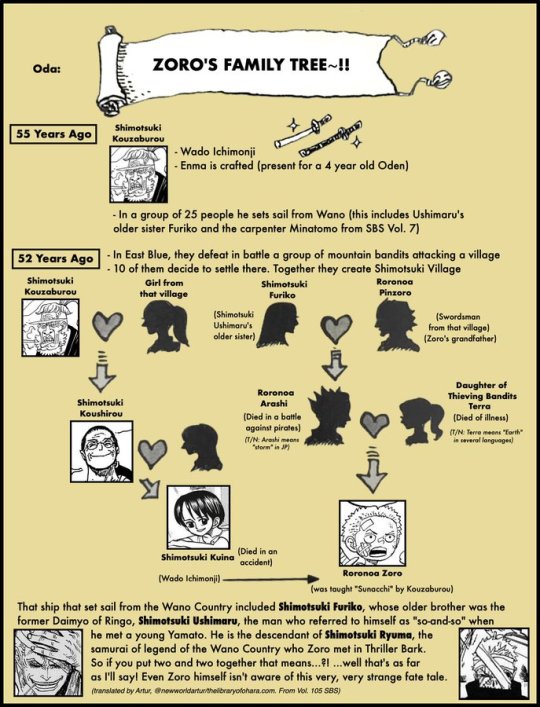
So, I just know all of Tumblr was wondering, "hey, you remember that really weird ZoLaw fan with the annoyingly overly stylized post? I wonder if she's seen this and if she has any theories or thoughts, an observation or two?"
Well, allow me to set your wandering mind at ease, fictional Tumblr fan. The answer is: No. No, I really don't.
I have like three hundred.
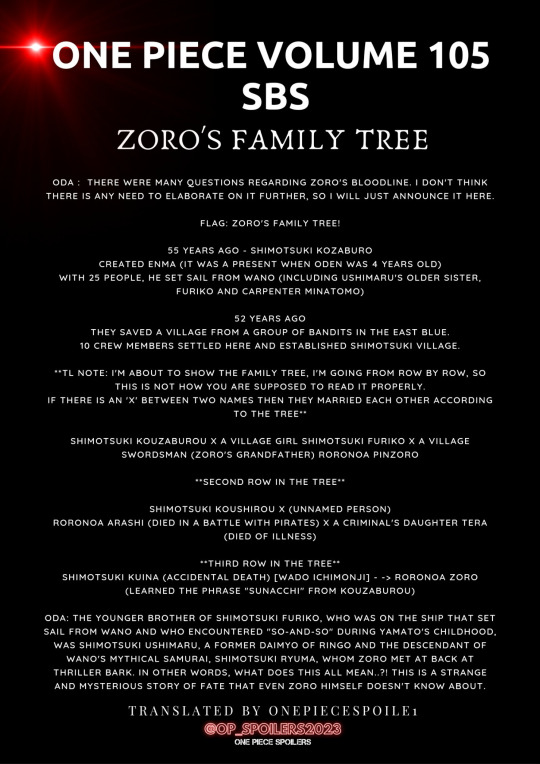
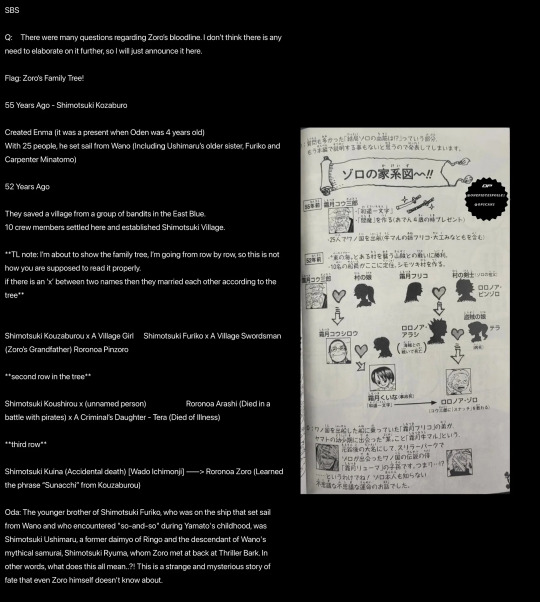
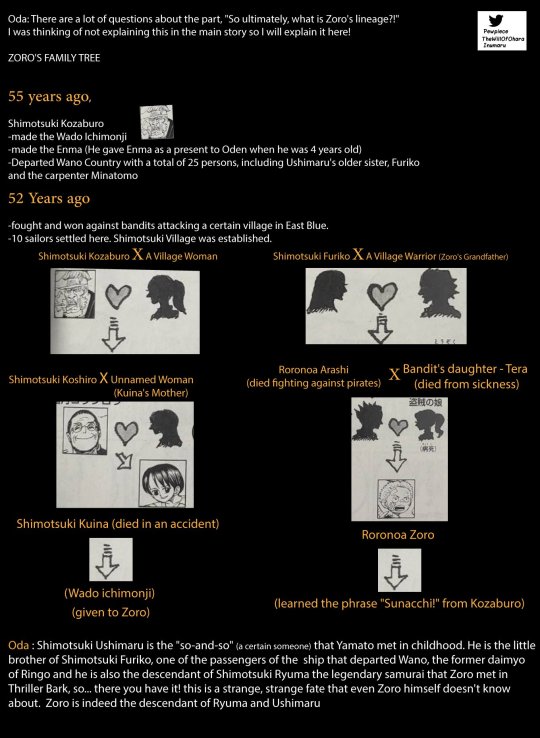
[I also spent time just trying to track down as many translations as possible. Is Tera A Criminal's Daughter or The Daughter Of Thieving Bandits! These are CLEARLY separate things and can ENTIRELY change how her utter nonpresence in Zoro's life shaped him! Though I can take comfort in knowing that, regardless of what kind of crimes her father was committing they were more important than anything his daughter ever did in her entire life.]
And, hey, as might as well jump right into that whole mess.
1. Wait, Zoro's mom is dead? Thank goodness, I was worried Oda forgot one!
(AKA: Stop. Murdering. Moms.)
I'll go first, I don't mind saying when I was wrong. True, in the past I may have suggested that the vast majority of female characters in One Piece come off as ever so slightly, "leaning into sexist tropes with unadulterated joy; it's the misogynistic tropes equivalent of a child running naked through a grocery store. It's right there, everyone sees it, yet people shut up and continue shopping in part because, well, these days you just expect most people to cover that junk! What would you even say? And if you DO speak up and call out the inappropriate, be prepared for blank stares and tantrums; but THEY don't mind! THEY don't think it's wrong! You're just being mean!"
More or less a direct quote.
However, I see now that I rushed to judgement and the reality of the situation is far more nuanced. With that in mind, I was just wondering if someone could help answer some of the questions I have.
Like: Why does Oda believe that it's illegal for (maternal) female characters to survive other character's backstories?
More importantly, why hasn't someone just reached out to explain the misconception!? It can't be that difficult. If nothing else, just have a lawyer or judge or other expert in censorship on hand. Or is the one of those cases where back in highschool his friends made something up and then kept pretending it was real to see if he'd believe you and not only did he fall for it, it took over 20 years before he learned that, what, no that's not illegal. That would be crazy if it were an actual law. Cause you know, after the first 10 years I think yeah you have to just lean into it. Pretend it's a creative decision on your part and definitely not because you were terrified of being sentenced to a slow and humiliating public death.
Just to be clear that's definitely what's up, right? I mean, I'm struggling to think of another reason....able excuse why a story that I really enjoy keeps playing the same old sexist tropes cards again and again to the point of absurdity. It would just help if I had a valid excus- explanation. I almost mistyped the word explanation.
....
....
So I imagine it went like.
"That's the third mangaka they've had to Publically Execute this week!"
"They've started taking this law way more serious lately."
"This one really deserved it though! I heard his main character has a mother in her late forties!"
"That does seem old to have your first child."
"No, he's the middle of three and 22 years old. The story even has flashbacks of defining moments in his childhood and never once did she try to sacrifice herself for him, get murdered by his enemies, or die in meaningless unrelated accidents."
"Damn, that's cold to be there for all the protagonist core moments and not die and help him develop and grow a character? They must have a very antagonistic relationship. Is she actually the villain."
"Not that we know, and when they asked about this being a possible plot twist since - obviously if she's evil no laws are being broken."
"Well, of course, that's the whole reason Statue 2-dash-57 exists; if creators can show they have consistently been building up to a surprise twist then the female character in question can continue to live so long as she continues to be unrepentant and unlikable until the resolution of her arch by the protagonist."
"That's the thing! Under oath not only did man present no evidence to support her identity as a secret villain, he went on the record stating he wanted to depict their relationship as one of a normal modern 20 year old and his mother."
"That can't be true! What publishing company would even print that!?"
"It gets worse. I told you he was a middle child? Well, according to those who've read the actual manga, his younger sister was really sick as a child."
"Oh, well, at least-"
"It was just a fish allergy. She's perfectly fine."
"Sometimes I feel this law is unnecessarily harsh but.... Then you hear stories like that, and you realize that some people really are monsters."
#So this was going to be one post three parts (because obviously) then I remembered even people who have purposefully followed me hate that#I took into consideration that not everyone wants a unmountable wall of Zoro meta analysis on their dash so now its gonna be 3 post style#keeping in mind I've already written it all up and will just be posting them one after the other so effectively the same result#only with the illusion of my empathetic nature#I do have a lot of thoughts on what amounts to a very small amount of scribbled lines and a couple doodles#he literally didn't even bother giving Kuina's mom or grandmothers a name like they didn't even have a identity#In fairness there wasn't a need for them to have any kind of identities or individuality or identifiable features#everyone knows only one trait really matters when it comes to adult females: they go down#into the ground....as a corpse. After ensuring that their death would be the best way to help their children grow. As characters.#I'm joking cuz its funny. It's obvious why Zoro's mom got a name & description: she gave birth to a protagonist and not a human sacrifice#But have considered why those specific qualities are what he chose to define her by - she's fictional he could have made up anything!#I'll have to talk about it in the other posts I'm wasting precious tag room#one piece#roronoa zoro#one piece meta#one piece sexism#this post is not for everyone; actually its pretty much just for me#conversations with fictional people#more opinions than anyone asked for about subjects they don't even care about#Oh! I found the blogs new subtitle!#author gets sassy then preachy then sassy again and then swerves sharply to the weird#oh these tags are way too much#Zoro's backstory#Zoro family history#amusing musings#why am i the way that i am#three post style: part one!
51 notes
·
View notes
Text

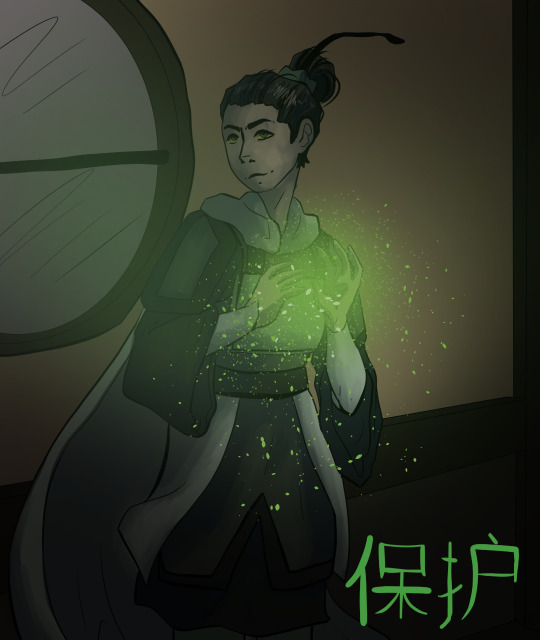

Cause I don't want to make this a ridiculously long infodump, you only get three of the secondary ring kwami's (Pollen and Duusu will be posted next don't worry lol)
Nooroo, Wayzz, and Trixx are three of the five secondary ring kwami's within the Chinese Miracle box. As the name suggests, the secondary ring holds the second most powerful (to clarify that power is based on how many abilities may be passed on to a wielder, and less influenced by actual strength. Otherwise Orikko would be up there with Plagg and Tikki). As all the kwami's are, each of these three are associated with one specific creature, the only change being Nooroo as a moth rather than a butterfly.
Starting up top with Nooroo: Nooroo is the kwami of transmission and presents as male. He just wears a basic hanfu with chinese inspired robes because I didn't get all into his design for some reason... He can grant his wielder two individual powers, therefore, those transformed with the moth miraculous have the ability to grant power over others, as well as the power of mind which can only be used by those who have willingly accepted the akuma/power. After they have been given the power, they cannot reject the influence of the moth wielder unless the akuma somehow disappears. Nooroo has these powers himself, of course, though just like all kwamis, they are much more powerful than when used by the wielder and may face a severe consequence because of this. Nooroo is still a timid, shy little guy just like in canon. He's very reserved and often goes along with whatever people say, hence why it's so easy for Hawkmoth to get him to comply with his needs. He rarely chooses to speak, for often, he accidentally will control the actions of others with his words, even when they're not akumatized. Because of this, he rarely socialized with other kwamis and relied on Duusu to keep him in check.
Fun fact: Nooroo is the only kwami who has been kissed by another kwami.
Next we have Wayzz: Wayzz is the kwami of protection and presents as male. He wears an ancient looking chinese armor that he sorta just... combined throughout the centuries to just invent his own thing in a way.... He can grant his wielder two individual powers; Shell-ter (force field) and Shield (increases resistance to attacks). He has these powers himself, of course, but on a much larger scale. In addition to this, those wielding the turtle miraculous actually have naturally increased physical strength. Like in canon, Wayzz is one of the wiser kwamis. He knows how to set his priorities straight, and what to do in situations where choices may be tough. He's self sacrificing, and has a big heart. He sorta acts like some wise, noble uncle. He struggles to understand humor, but plays along like he does. It's all a game of pretend. He is usually very empathetic (except of course with sarcasm and humor), which would be why he was the only kwami who sensed Nooroo was in distress. He has a very protective nature over the ones he loves, so he wouldn't hesitate to go save them himself, even without a wielder.
Fun fact: Wayzz is the only kwami to have a wielder/master that lasted over one hundred years with him (and is still alive!)
Lastly we have Trixx: Trixx is the kwami of illusion and also presents as male. You'll never guess what he wears... omg it's just a basic robe. He can also grant two powers onto his wielder; Mirage (illusion) and nightmare (ability to make people see the things they fear most) (yes that's a terrible power for a superhero) (the pig one balances it out so shut up). Obviously he has these powers too though they're often powerful enough to fool himself so he typically refrains from using them. Also, no matter what he says (as well as the wielder of the fox miraculous) will be believed, even if it's an outrageous lie. In canon, it's hard to figure out Trixx's personality until season four, so I just enhanced the version of Trixx we saw glimpses of and made it my own thing. He's a deceptive, cheating little bastard. Him and Plagg are definitely besites. He's not very trustworthy, and likes to get into mischief for fun. He is a nuisance to deal with and is disliked by a lot of the kwamis from having to deal with his childish, rebellious behavior. He definitely considered giving his miraculous to Lila, before later deciding against it.
Fun fact: Trixx is the only kwami who is aromantic.
#so much writing i'm sorry#god why#if you actually read all of that then give it a reblog please I beg you#trixx is aromantic i'm sorry if that makes you uncomfortable#that is the only way i can see him lol#also you don't get to know who kissed nooroo... yet#miraculous#mlb#mlbrewrite#chat noir#ladybug#mlbredesign#art catastrophe#art catastrophe mlb rewrite#miracle box#art catastrophe miracle box#nooroo#trixx#wayzz#kwamis#mlbkwamis
42 notes
·
View notes
Video
tumblr
'Loki' takes over: Tom Hiddleston on his new TV series and a decade in the MCU
Ten years after Hiddleston first chose chaos in Thor, Marvel’s fan favorite God of Mischief is going even bigger with his time-bending Disney+ show.
Tom Hiddleston is Loki, and he is burdened with glorious purpose: After playing Thor's puckish brother for over a decade in the Marvel Cinematic Universe, no one understands the mercurial Asgardian God of Mischief as well as the actor. He can teach an entire seminar on Loki if given the opportunity — which he actually did during pre-production on his forthcoming Disney+ show. In conversation, Hiddleston quotes lines from his MCU debut, 2011's Thor, almost verbatim, and will playfully correct you if you mistakenly refer to Asgard's Rainbow Bridge as the Bifrost, which is the portal that connects Loki and Thor's homeworld to the Nine Realms, including Midgard, a.k.a. Earth. "Well, the Bifrost technically is the energy that runs through the bridge," he says with a smile. "But nine points to Gryffindor!" And when he shows up to the photo shoot for this very digital cover, he hops on a call with our photo editor to pitch ways the concept could be even more Loki, like incorporating the flourish the trickster does whenever magically conjuring something. The lasting impression is that playing Loki isn't just a paycheck.
"Rather than ownership, it's a sense of responsibility I feel to give my best every time and do the best I can because I feel so grateful to be a part of what Marvel Studios has created," the 40-year-old Brit tells EW over Zoom a few days after the shoot and a week out from Thor's 10th anniversary. "I just want to make sure I've honored that responsibility with the best that I can give and the most care and thought and energy."
After appearing in three Thor movies and three Avengers, Hiddleston is bringing that passion to his first solo Marvel project, Loki, the House of Ideas' third Disney+ series following the sitcom pastiche WandaVision and the topical The Falcon and the Winter Soldier. Led by head writer Michael Waldron (Doctor Strange in the Multiverse of Madness, Heels), the six-episode drama sees Hiddleston's shapeshifting agent of chaos step out from behind his brother's shadow and into the spotlight for a timey-wimey, sci-fi adventure that aims to get to the bottom of who Loki really is. "I wanted to explore slightly more complex character questions," says Waldron. "It's not just good versus bad. Is anybody all good? Is anybody all bad? What makes a hero, a hero? A villain, a villain?"
Even though Loki — who loves sowing mayhem with his illusion magic and shapeshifting, all with a major chip on his shoulder — has never been one for introspection, the idea of building an entire show around him was a no-brainer for Marvel. When asked why Loki was one of the studio's first Disney+ shows, Marvel president Kevin Feige replies matter-of-factly, "More Hiddleston, more Loki." First introduced as Thor's (Chris Hemsworth) envious brother in Kenneth Branagh's Thor, Loki went full Big Bad in 2012's The Avengers. That film cemented the impish rogue as one of the shared universe's fan favorites, thanks to Hiddleston's ability to make him deliciously villainous yet charismatic and, most importantly, empathetic. The character's popularity is one of the reasons he's managed to avoid death many times.
"He's been around for thousands of years. He had all sorts of adventures," says Feige. "Wanting to fill in the blanks and see much more of Loki's story [was] the initial desire [for the series]."
The Loki we meet on the show is not the one who fought the Avengers in 2012 and evolved into an antihero in Thor: The Dark World and Thor: Ragnarok before meeting his demise at the hands of the mad titan Thanos (Josh Brolin) in 2018's Avengers: Infinity War. Instead, we'll be following a Loki from a branched timeline (a variant, if you will) after he stole the Tesseract following his thwarted New York invasion and escaped S.H.I.E.L.D. custody during the time heist featured in Avengers: Endgame. In other words, this Loki hasn't gone through any sort of redemption arc. He's still the charming yet petulant god who firmly believes he's destined to rule and has never gotten his due.
Premiering June 9, Loki begins with the Time Variance Authority — a bureaucratic organization tasked with safeguarding the proper flow of time — arresting the Loki Variant seen in Endgame because they want his help fixing all of the timeline problems he caused while on the run with the Tesseract. So there will be time travel, and a lot more of it than in Endgame. As Loki makes his way through his own procedural, he'll match wits with new characters including Owen Wilson's Agent Mobius, a brilliant TVA analyst, and Gugu Mbatha-Raw's Judge Renslayer. The question in early episodes is whether Loki will help them or take over.
"One of the things Kevin Feige led on was, 'I think we should find a way of exploring the parts of Loki that are independent of his relationship with Thor,' or see him in a duality or in relationship with others, which I thought was very exciting," says Hiddleston, who also serves as an executive producer on the show. "So the Odinson saga, that trilogy of films, still has its integrity, and we don't have to reopen it and retell it."
Yet, in order to understand where Loki is going, it's important to see where he came from.
Hiddleston can't believe how long he and Loki have been connected. "I've been playing this character for 11 years," he says. "Which is the first time I have said that sentence, I realize, and it [blows] my mind. I don't know what percentage that is exactly of my 40 years of being alive, but it's substantial."
His time as Loki actually goes a bit further back, to 2009 — a year after Robert Downey Jr. big banged the MCU into existence with Iron Man — when he auditioned for Thor. It's no secret that Hiddleston initially went in for the role of the titular God of Thunder, but Feige and director Kenneth Branagh thought his natural charm and flexibility as an actor made him better suited for the movie's damaged antagonist. "Tom gave you an impression that he could be ready for anything, performance-wise," says Branagh, who had previously worked with him on a West End revival of Checkov's Ivanov and the BBC series Wallander. "Tom has a wild imagination, so does Loki. He's got a mischievous sense of humor and he was ready to play. It felt like he had a star personality, but he was a team player."
Hiddleston fully immersed himself in the character. Outside of studying Loki's history in the Marvel Comics, he also researched how Loki and the Trickster God archetype appeared across mythology and different cultures. "He understood that he was already in something special [and] it was a special character in a special part of that early moment in the life of the Marvel universe where [he] also needed to step up in other ways," says Branagh, who was impressed by the emotional depth Hiddleston brought to the part, especially when it came to how isolated Loki felt in the Asgardian royal family.
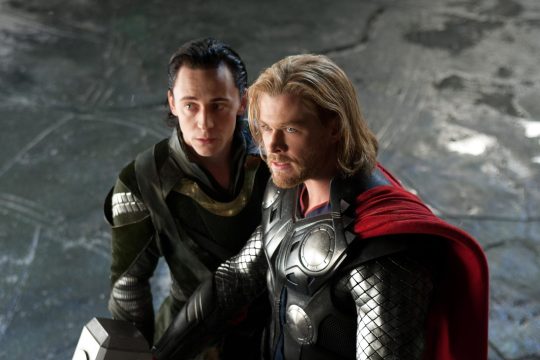
There was a lot riding on that first Thor feature. For one, no one knew if audiences would immediately latch onto a Shakespearean superhero movie partially set on an alien planet populated by the Norse Gods of legend. Second, it was integral to Feige's plans for the shared universe. Loki was supposed to be the main villain in The Avengers, which would not only mirror how Earth's mightiest heroes joined forces in 1963's Avengers #1 but also give Thor a believable reason for teaming up with Iron Man, Captain America (Chris Evans), and the rest of the capes. Feige first clued Hiddleston into those larger plans when the actor was in L.A. before Thor started shooting.
"I was like, 'Excuse me?' Because he was already three, four steps ahead," says Hiddleston. "That took me a few minutes to process, because I didn't quite realize how it just suddenly had a scope. And being cast as Loki, I realized, was a very significant moment for me in my life, and was going to remain. The creative journey was going to be so exciting."
Hiddleston relished the opportunity to go full villain in Avengers, like in the scene where Loki ordered a crowd to kneel before him outside a German opera house: "It's the unspoken truth of humanity, that you crave subjugation," says the Machiavellian god. "The bright lure of freedom diminishes your life's joy in a mad scramble for power, for identity. You were made to be ruled. In the end, you will always kneel."
"I just knew that in the structure of that film, I had to lean into his role as a pure antagonist," Hiddleston recalls. "What I always found curious and complex about the way Loki is written in Avengers, is that his status as an antagonist comes from the same well of not belonging and being marginalized and isolated in the first Thor film. Loki now knows he has no place in Asgard."
Loki did find a place within the audience's hearts, though. Feige was "all in" on Hiddleston as his Loki from the beginning, but even he couldn't predict how much fans would love him. Feige recalls the reaction at the 2013 San Diego Comic-Con: "Did we know that after he was the villain in two movies, he would be bringing thousands of people to their feet in Hall H, in costume, chanting his name? No, that was above and beyond the plan that we were hoping for and dreaming of." It was a dream Feige first got an inkling of a year earlier during the Avengers press tour when a Russian fan slipped past security, snuck into Mark Ruffalo's car, and asked the Hulk actor to give Hiddleston a piece of fan art she created. "That was one of the early signs there was much more happening with this quote-unquote villain."
Despite that popularity, the plan was to kill Loki off in 2013's Thor: The Dark World, but the studio reversed course after test audiences refused to believe he actually died fighting the Dark Elves. Alas, he couldn't out-illusion death forever. After returning in Taika Waititi's colorful and idiosyncratic Thor: Ragnarok, Hiddleston's character perished for real in the opening moments of Infinity War. In typical Loki fashion, before Thanos crushed his windpipe, he delivered a defiant speech that indicated he'd finally made peace with the anger he felt toward his family.
"It felt very, very final, and I thought, 'Okay, that's it. This is Loki's final bow and a conclusive end to the Odinson saga,'" says Hiddleston, who shot that well-earned death scene in 2017.
But, though he didn't know it yet, the actor's MCU story was far from over.
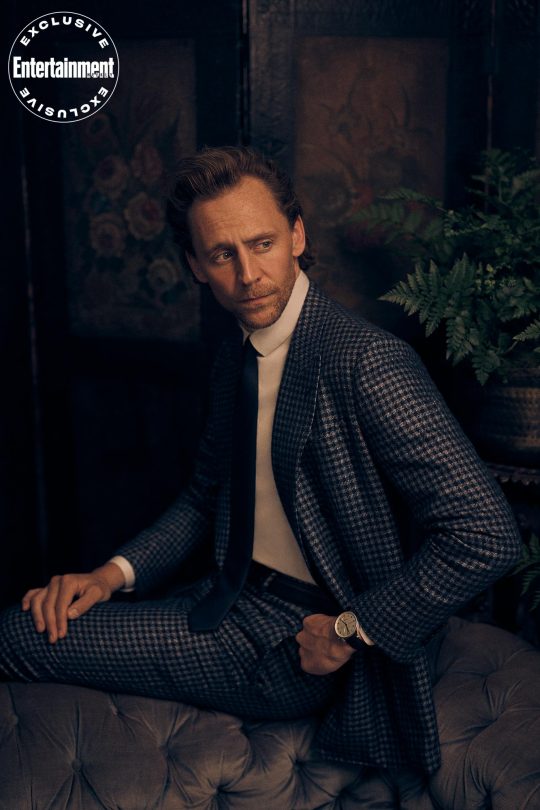
Credit: Charlie Gray for EW
When Hiddleston returned to film two scenes in Avengers: Endgame in 2017, he had no idea where Loki portaled off to after snatching the Tesseract. "Where'd he go? When does he go? How does he get there? These are all questions I remember asking on the day, and then not being given any answers," Hiddleston recalls. To be fair, it's likely the Powers That Be didn't necessarily have answers then. While Feige can't exactly recall when the writers' room for Endgame first devised Loki's escape sequence, he does know that setting up a future show wasn't the primary goal — because a Loki series wasn't on the horizon just yet.
"[That scene] was really more of a wrinkle so that one of the missions that the Avengers went on in Endgame could get screwed up and not go well, which is what required Cap and Tony to go further back in time to the '70s," says Feige. Soon after that, though, former Disney CEO Bob Iger approached Feige about producing content for the studio's forthcoming streaming service. "I think the notion that we had left this hanging loose end with Loki gave us the in for what a Loki series could be. So by the time [Endgame] came out, we did know where it was going."
As for Hiddleston, he didn't find out about the plans for a Loki show until spring 2018, a few weeks before Infinity War hit theaters. "I probably should not have been surprised, but I was," says the actor. "But only because Infinity War had felt so final."
Nevertheless, Hiddleston was excited about returning for his show. He was eager to explore Loki's powers, especially the shapeshifting, and what it meant that this disruptive figure still managed to find a seat beside the gods in mythology. "I love this idea [of] Loki's chaotic energy somehow being something we need. Even though, for all sorts of reasons, you don't know whether you can trust him. You don't know whether he's going to betray you. You don't why he's doing what he's doing," says Hiddleston. "If he's shapeshifting so often, does he even know who he is? And is he even interested in understanding who he is? Underneath all those masks, underneath the charm and the wit, which is kind of a defense anyway, does Loki have an authentic self? Is he introspective enough or brave enough to find out? I think all of those ideas are all in the series — ideas about identity, ideas about self-knowledge, self-acceptance, and the difficulty of it."
“The series will explore Loki's powers in a way they have not yet been explored, which is very, very exciting.”
The thing that truly sold Hiddleston on the show was Marvel's decision to include the Time Variance Authority, a move he describes as "the best idea that anybody had pertaining to the series." Feige and Loki executive producer Stephen Broussard had hoped to find a place for the TVA — an organization that debuted in 1986's Thor #372 and has appeared in She-Hulk and Fantastic Four stories — in the MCU for years, but the right opportunity never presented itself until Loki came along. "Putting Loki into his own procedural series became the eureka moment for the show," says Feige.
The TVA's perspective on time and reality also tied into the themes that Waldron, Loki's head writer, was hoping to explore. "Loki is a character that's always reckoning with his own identity, and the TVA, by virtue of what they do, is uniquely suited to hold up a mirror to Loki and make him really confront who he is and who he was supposed to be," says Waldron. Hiddleston adds: "[That] was very exciting because in the other films, there was always something about Loki that was very controlled. He seemed to know exactly what the cards in his hand were and how he was going to play them…. And Loki versus the TVA is Loki out of control immediately, and in an environment in which he's completely behind the pace, out of his comfort zone, destabilized, and acting out."
To truly dig into who Loki is, the creative team had to learn from the man who knows him best: Hiddleston. "I got him to do a thing called Loki School when we first started," says director Kate Herron. "I asked him to basically talk through his 10 years of the MCU — from costumes to stunts, to emotionally how he felt in each movie. It was fantastic."
Hiddleston got something out of the Loki school, too. Owen Wilson both attended the class and interviewed Hiddleston afterward so that he could better understand Loki, as his character Mobius is supposed to be an expert on him. During their conversation, Wilson pointedly asked Hiddleston what he loved about playing the character.
"And I said, 'I think it's because he has so much range,'" says Hiddleston. "I remember saying this to him: 'On the 88 keys on the piano, he can play the twinkly light keys at the top. He can keep it witty and light, and he's the God of Mischief, but he can also go down to the other side and play the heavy keys. And he can play some really profound chords down there, which are about grief and betrayal and loss and heartbreak and jealousy and pride.'" Hiddleston recalls Wilson being moved by the description: "He said, 'I think I might say that in the show.' And it was such a brilliant insight for me into how open Owen is as an artist and a performer.'"
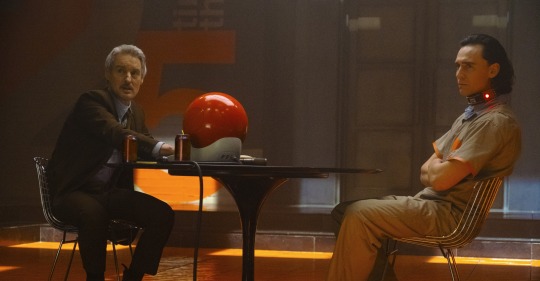
Owen Wilson as Mobius and Tom Hiddleston as Loki in 'Loki.'| Credit: Chuck Zlotnick/Marvel Studios
Everyone involved is particularly excited for audiences to see Hiddleston and Wilson's on-screen chemistry. "Mobius is not unlike Owen Wilson in that he's sort of nonplussed by the MCU," says Feige. "[Loki] is used to getting a reaction out of people, whether it's his brother or his father, or the other Avengers. He likes to be very flamboyant and theatrical. Mobius doesn't give him the reaction he's looking for. That leads to a very unique relationship that Loki's not used to."
As for the rest of the series, we know that Loki will be jumping around time and reality, but the creative team isn't keen on revealing when and where. "Every episode, we tried to take inspiration from different things," says Waldron, citing Blade Runner's noir aesthetic as one example.
"Part of the fun of the multiverse and playing with time is seeing other versions of characters, and other versions of the titular character in particular," says Feige, who also declined to confirm if Loki ties into Doctor Strange in the Multiverse of Madness and/or other upcoming projects.
Making Loki was especially meaningful to Hiddleston because they shot most of it during the pandemic, in late 2020. "It will remain one of the absolute most intense, most rewarding experiences of my life," he says. "It's a series about time, and the value of time, and what time is worth, and I suppose what the experience of being alive is worth. And I don't quite know yet, and maybe I don't have perspective on it, if all the thinking and the reflecting that we did during the lockdown ended up in the series. But in some way, it must have because everything we make is a snapshot of where we were in our lives at that time."
While it remains to be seen what the future holds for Loki beyond this initial season, Hiddleston isn't preparing to put the character to bed yet. "I'm open to everything," he says. "I have said goodbye to the character. I've said hello to the character. I said goodbye to the character [again]. I've learned not to make assumptions, I suppose. I'm just grateful that I'm still here, and there are still new roads to explore."
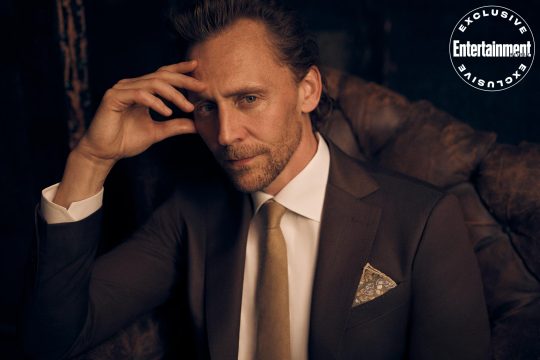
519 notes
·
View notes
Text
Distance II
Characters: Ningguang, Zhongli, gn!reader
Word Count: 3,605
Warnings: None
Premise: What other explanation could there be? Surely this is the one logical answer. Even if it hurts, even if it doesn’t make sense.
In which the reader’s s/o assumes the reader is no longer interested.
Author’s Note: Though Ningguang is hands down one of my favorite characters I find her surprisingly difficult to write. She just seems so much more in control than I am. Perhaps though that makes writing her in conflict all the more rewarding.
Ningguang
Sometimes Ningguang wondered if she wasn’t accidentally proving her detractors right by not caring.
Being the Tianquan of the Liyue Qixing it’d be nearly impossible for her not to hear the rumors that circulated about her, the not-so-quiet whisperings of people who found her too cold, too callous, too closed off to have any genuine feelings. Nor were such incidents limited to the murmurings of coworkers or the blunt admissions of Keqing. Ningguang had long ago lost track of the times she’d passed someone on the street, only to find someone proclaiming how unfit she was to represent Liyue, she who had no genuine feelings.
Of course, Ningguang couldn’t truly complain. Even if people saw her as aloof and shallow, she was still given the respect due to her position. Nor could the privilege and power of being the Tianquan be overstated. Really, being isolated in such a way was just the price she had to pay for her success. What did it really matter what the general population thought of her personally as long as they respected her competency? Besides, she didn’t have time for close interpersonal relationships.
Perhaps it was this thinking that had ruled her for so long that made you so special in her eyes. Though you would later admit that you had worried your feelings had been one-sided, Ningguang had been just as captivated with you as you of her. Incredibly competent at your job, as devoted to Liyue as Ningguang was, and deeply empathetic on top of it, how could Ningguang not grow somewhat infatuated with you? She had never expected the same emotion on your side, just as you had never expected such a thing of her; not because you saw Ningguang as made of ice or stone, it was merely the natural nervousness that always came with love. Perhaps that was the part of your confession that Ningguang appreciated the most. To you she was just as normal as anyone else, with a heart made out of the same flesh as all the other residents of Liyue.
Yet being in a relationship had proved a much greater challenge than Ningguang expected, and in the place one was least likely to think about. Her love for you was never in question, the devotion you two shared towards one another was something spelled out plainly in front of her eyes. Nor did she worry about providing for you, or you for her. Being both high ranking members of the Liyue Qixing, the two of you were incredibly lucky, and finances and worries about saving was never something that Ningguang had to lose sleep over. No, it was none of those normal things that Ningguang had to worry about, instead it was herself.
She had expected that all the whisperings about her emotional capabilities would have left once the word of you two being partners got around. Instead the whispers seemed all the greater, swirling around her at every turn. Though logically that could not be the case, Ningguang found that logic ultimately played a very little role in the matter of love and affection. Even when she wasn’t haunted by the whispers of others she found herself more and more facing her own words. How could someone so closed off and reserved be a good partner, her mind seemed to whisper, how could she possibly give you the affection and warmth you deserved? Ningguang never told you these thoughts of course, her anxiety seizing her whenever the idea so much as passed through her head. Still those thoughts lingered.
And then work got busier; well, busier for her at least. For you things seemed to remain about the same, and though Ningguang was somewhat grateful for that – knowing that overworking oneself was a bit of a theme for members of the Liyue Qixing – she still found herself uncomfortable at the new schedule. Now instead of the two of your finishing up at around the same time, it seemed like you always had to hold back and wait for her. It was embarrassing, really; more than that it felt unfair to you.
“Should I reschedule the dinner reservations tonight?” Your question hung over the desk that separated the two of you, paper piled up like a wall between you and her.
“I’m afraid so, I’m sorry darling.” Ningguang offered an awkward smile.
“Don’t be sorry! It’s not your fault that you have so much work. I’ll go down and tell the waitress during lunch break, we should be able to get a refund, and maybe a reschedule. After all, we haven’t been out together in so long.”
“I’m sorry.”
“It’s not your fault,” you leaned over the desk, too blocked by the papers to give her the traditional comfort kiss on her cheek, “you have a very important job, and no one could fault you for it.”
Despite your words Ningguang couldn’t help but feel somewhat chastised. Bowing her head she whispered a soft “thank you”, wondering how much you were hiding your true feelings. Keeping her head mostly down at her work for the rest of the morning the Tianquan was startled by the realization she hadn’t noticed you leaving for lunch.
“Unfortunately I was unable to get a refund,” your apologetic voice floated through the air as you reentered the office, “so I was wondering whether or not I could bring a friend out to dinner tonight? Of course I would pay for the whole thing myself, and we could still reschedule. Although maybe next time let’s pick a restaurant without an all-or-nothing view on payment.”
“A good idea about the payments,” Ningguang smiled awkwardly, ill at ease despite your slight laughter, “and of course you may invite a friend out for dinner. I know that we’ll find another time.”
“You’re an absolute darling you know!” You walked around the desk giving Ningguang a fleeting kiss on her cheek. “Thank you for being so understanding.”
“How could I not be when I’m the reason we can’t go out this evening?”
“Well, I don’t know. Some people aren’t so nice about those things you know.”
“I hope to never be involved with those people.”
“You’re right about that!” You laughed, bringing a small smile to Ningguang’s face. Still, a part of her felt leaden, her embarrassment and guilt weighing her down like a rock.
Afterwards it seemed that a bit of a routine had been found in your life. After your work was done and your errands finished you laughed awkwardly, gave Ningguang a short kiss, and went out to spend time with your friends. Not that Ningguang begrudged you the time you spent with others, she wasn’t about to ask you to spend all your time with her, especially when most of it would be spent staring at her reading. Still it was hard not to see these continual outings as further proof of how little affection Ningguang was giving you, how much she was failing at providing you all the love and emotional support you needed.
Walking down the streets to your house Ningguang took in the sight of Liyue in the evening. It was her favorite time of day; the lanterns turned the normally drab grey stones into burnisheds amber, basking the buildings with a soft orange glow that gave the illusion of perfect domesticity. It was easy to forget the troubles of Liyue in the evening, easy to be wrapped up in the landscape in front of the Tianquan, easy to ignore her troubles. Passing by the docks Ningguang breathed in the scent of a trading city at work. Smells, sights, and conversations mixed together in a familiar dance, lively despite the lateness of the hour.
“Did you see the Tianquan’s partner was out again this evening?”
Ningguang found herself standing perfectly still, unsure if the words that she had just heard weren’t a figment of her exhausted imagination. Turning towards the stalls she was careful to keep her pace as even as possible, hoping that her presence would go largely unnoticed.
“Oh yes, I saw them walking along the shipyard with a few people. You could tell it wasn’t on business.”
“I feel bad for them,” the first voice piped up again, voice heavy with authority, “to have a block of ice as a partner, it must be very difficult.”
“You’re right, the poor dear. Honestly I don’t know why they decided to become partners with such a person as Lady Ningguang, I heard that she was the one confessed to even. Why anyone would actively cultivate such a relationship, I don’t understand it.”
“Neither do I. They must be very used to living without affection.”
“You’re probably right, it always ends up that way with those types of relationships.”
Although the conversation showed no signs of ending Ningguang found herself turning around and leaving. The words had felt like a slap in the face, and she felt almost feverish in her wish for the conversation to have never happened.
Once she arrived at your home Ningguang rushed to the bedroom, collapsing onto the soft sheets. You, she realized that she wanted you; wanted to tell you what had just happened, wanted you to assure her it was all false, wanted all this insecurity to go away. And yet, how could she be sure that you weren’t thinking a similar thing as those people Ningguang had overheard? How could she be sure you hadn’t come to the conclusion that she was indeed without feeling. There was only one way to figure it out really, no matter how painful.
“I’m home!” Your voice was bright and cheerful, a stark contrast to Ningguang’s current emotional state.
“Welcome home dear.”
“Oh I’m exhausted, I think I’m taking a bath and going right to bed tonight! You should probably sleep too, you’ve really been overworking yourself!” You chastised, giving Ningguang an impatient sort of smile as you put away your things. Taking a deep breath Ningguang prepared herself.
“Before you do that, there is something I’d like to ask you.”
“Ask away! Unless you’re asking for me to cook, I think I’m too tired for that.”
“It’s not about cooking. It’s, well, it’s whether this relationship is fulfilling or not to you.”
“What?” The happiness leeched from your voice as you stared at Ningguang.
“I heard some people talking today, saying that I wasn’t a worthy partner, that I was too emotionally detached. I know that you have never expressed such an opinion, but I cannot help but wonder if I’m truly giving you what people want in a relationship. You said yourself that we hardly spend time together anymore, and I know how much you value quality time. As such, I feel that I have to lay out all your options. If you feel that this relationship is no longer viable, then I understand.”
“Ningguang what in Teyvat are you talking about?” You burst out. Swiftly closing the distance between you two, you intertwined your fingers with Ningguang’s. “You don’t really think that I would share the opinion of some people who know nothing about you and us do you?”
“It’s not just them!” Ningguang pointed out. “I’ve heard the same things from colleagues. Besides this wasn’t brought on all of a sudden. For a while now I’ve been wondering if I truly have the capacity to make you happy.”
“Well let me clear that up immediately, the answer is yes.”
You stared into Ningguang’s eyes, expression one of stubborn surety. There was no sense of doubt in your posture or your voice. For the first time in a while Ningguang found herself somewhat calm.
“Let me tell you something Ningguang, relationships aren’t the same for everyone, nor is love. Some people need huge declarations of love, need to always be attached to their partner, need a constant supply of affection. And some need only small gestures, shorter periods of time, a softer form of support. Neither of these are inherently better than the other. Just because we don’t go out to eat every night, just because you place care and effort into your work and choose to spend your time on it, that doesn’t mean that I don’t love you any less, or that your love doesn’t reach me. I’m proud of your work, I’m proud to call my partner the Tianquan; and if other people cannot understand or accept that, then frankly I don’t care.”
“Are you sure?”
“Of course I’m sure!” You let out a laugh, throwing your arms around your partner. “My mind is very made up on this. Besides, you’re much more affectionate than you let on.”
It was as if she’d been suddenly freed from a cage, so immediate was the relief that washed over Ningguang. Returning the embrace she sighed softly, overwhelmed by the love and confidence in your words.
“Thank you,” she whispered.
“Don’t thank me for anything, you would do the exact same for me.”
“Perhaps you’re right, but thank you nevertheless. Thank you.”
“Well then you’re welcome; though I would do anything for the woman I love.”
“I love you too.”
There was nothing more to say.
Zhongli
“I hope that it ends soon.”
Those words had sent Zhongli spiraling, reeling as the ground crumbled beneath him and he plunged into some dark unknown. How had he gotten here, it didn’t seem to make sense.
He hadn’t wanted to step upon your freedom, to limit you in any way. Though Zhongli wasn’t perhaps the greatest expert on human feelings, he knew that in one way they differed greatly from archons and adepti. Humans always vied for freedom. The freedom to choose, the freedom to do, the freedom to go or stay. While the gods always found any sort of profound change incredibly difficult, an erosion on their power and their influence, humans craved the ways that time waxed and waned, the world with it.
As such he didn’t attempt to put any sort of confinement on your relationship. Being the first human Zhongli had had any meaningful emotional contact with, he was absolutely determined that your relationship should be framed around your needs, which were certainly more demanding as a human being than Zhongli’s could ever be. Not that he ever found himself lacking, indeed it seemed sometimes to the ex-archon as if you were more aware of what his wishes were than he was of yours. When he needed assurance you were there, when something required some sort of explanation or reiteration you were glad to provide it. No matter the time or the place or the setting you were liberal with your love. Zhongli could only hope he provided the same for you.
Perhaps that was why your words surprised him so much. Zhongli knew that your friend was coming over for tea, and had made an effort to leave the Wangsheng Funeral Parlor earlier than usual, much to the annoyance of his pseudo-employer. Though he expect you to be earlier than him, he certainly hadn’t expected your sudden volte-face, the sudden revelation that all was not well.
Not that he could ask about your statement while your friend was visiting, the ex-archon knew that you hated a scene as much as he did, and he doubted he’d be able to get an honest answer out of you with an audience watching. So as he entered, making sure to make as much noise as possible to alert you of his arrival, he tried to bury the sentence in the back of his mind, hoping that it would stay put as long as possible.
Thankfully for Zhongli it is much easier to be patient when one is an immortal former deity. Though time certainly seemed slower than usual, the conversation you and your friend had more difficult to follow than usual, it was nothing that he couldn’t handle. Letting you and your friend chat about anything from work to pets to weather, only interrupting when asked about the tea, Zhongli spent the afternoon turning over your words in his head, and wondering what he was going to say.
Finally the sun dipped behind the buildings, and as the long shadows of evening began to cast themselves down your friend left. Keeping himself as formal as possible during the entire encounter Zhongli let out a soft sigh when the door closed behind them. Even if what was to come was not something he was particularly looking forward to, Zhongli had long ago learned that immediate pain is better than drawn out suffering.
“You were awfully quiet this afternoon.” You pointed out, going to clear up the plates.
“I, I had not noticed. I am sorry.”
“It’s fine, I know that they’re a bit of a talker anyways. Still I was hoping you might say more, my friends already ask me about your reticence, and I don’t want to feed their imaginations.”
“My apologies, I will try to do better.”
“Don’t sweat it really, I’m just rambling.” You smiled as Zhongli began to put away the tea set. “I always love watching you clean the china, it’s so peaceful to watch.”
“I am glad you enjoy it so much,” Zhongli replied, careful to keep his hands from trembling. The conversation loomed ahead of him, dark and unfamiliar, and he didn’t want to break anything in the process. “I, uh, I noticed that you were discussing something when I walked in.”
“I’m sorry we started before you, I didn’t know how long Hu Tao would hold you up. She’s surprisingly persuasive, at least when she’s not selling coffins.” You let out a giggle.
“In light of your conversation, I would like to offer you something.”
“Yes?” You furrowed your brow, evidently puzzled.
“I would like to offer you an end to our relationship.”
“Excuse me?” Your mouth dropped open as you jolted up suddenly in your chair. “What, why? I… what?”
“I do not wish to cause you any pain by forcing you to draw this out. If you wish for things to end quickly, then you ought not to worry about stalling. I promise that I will not contain you.”
“Zhongli, I don’t understand what you’re saying?” Your voice sounded very raw. “Are you saying, are you saying that you don’t want to be in a relationship anymore.”
“No.” Zhongli replied slowly, feeling as if the situation had altogether managed to reverse itself. “I am only saying that if I am tying you down, that if I am no longer making you happy, then you do not have to continue this relationship.”
“Zhongli, I don’t understand why you would ever think that I would want that.”
“But you said ‘I hope that it ends soon’.”
For a moment you stared at your partner, but then something seemed to overtake you and you began to laugh, an awkward sound stranded between relief and humor.
“A commission I was talking about a commission! There’s this tradesman who is trying to set up some sort of security measures with the Guild while he’s stopped in Liyue, and it’s taking up most of my time. It’s why I haven’t visited you at the Funeral Parlor recently as well. Believe me Zhongli, I would never want to break up with you, the idea of doing so makes me miserable.”
“Ah, I see.”
Zhongli wasn’t sure whether he should feel overwhelming relief or embarrassment. That question was put off however as you walked over to where he was sitting and threw your arms around him. Returning the embrace Zhongli pressed soft kisses all over your face. Relief washed over him, and he felt almost dizzy with relief. Though he had tried to tell himself that he wouldn’t let his own emotions rob you of your agency, now that the moment had passed the ex-archon could admit how truly shaken he was, and how much the idea of his days spend utterly devoid of your presence seemed unbearably lonely.
“I still don’t know how you ever jumped to such a conclusion.” You mumbled, leaning over to press a soft kiss on Zhongli’s lips.
The rest of the evening had been spent in a revery of frantic relief, both of you unwilling to stray very far from each other’s arms. Now the two of you lay tangled in bed together, overlapping limbs a solid reminder that all was well with the world.
“I do not want to rob you of your agency,” Zhongli replied, “I fear that I will tie you down. I know that the gods are old and staid, and unlikely to change. I know as well that humans often find such atmospheres stifling, and I fear that one day such a thing will come to pass.”
“Just because humans change their minds easily or want to travel or grow or whatever doesn’t mean that they don’t need an anchor,” you pointed out, voice heavy with fatigue, “we all need somewhere to go back to, we all need a home. You’re my home Zhongli, I never want to leave you.”
“You are my home as well. And I wish not to leave you either.”
“I’m glad the matter is settled then.” You smiled softly, before finally closing your eyes and drifting off to sleep.
“As am I.”
Zhongli lay awake a while, listening to the soft cadence of your breath. You had said it was humans that needed an anchor, but perhaps immortal beings did too. After all, you were the thing that kept Zhongli tethered to the world and the humans around him, and he loved you all the more for it.
#genshin impact fanfiction#ningguang x reader#zhongli x reader#ningguang#zhongli#genshin impact#requested#scenarios#my writing
200 notes
·
View notes
Text
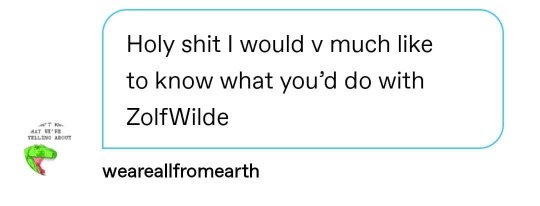
[Image ID: Screenshot of a tumblr reply from user @weareallfromearth saying “Holy shit I would V much like to know what you’d do with ZolfWilde.” End ID]
This was in response to me tag rambling that if Alex “I don’t Actually Have That Much Experience in Courtship” Newall and Ben “I just Realised I’m Too Straight For This” Meredith don’t know what to do with Zolf/Wilde, they should hand the ship over to me.
*rubs my gay little hands together.*
I initially characterized them offhandedly as Enemies-to-Lovers but that’s not quite it, is it? On reflection I would say it’s more of an Opposites Attract situation.
Oscar Wilde, as re-imagined in the RQG universe, is a homme fatale; a dangerous, attractive man, skilled in encouraging people to underestimate him, wearing different masks, never quite being able to trust or be trusted by anyone.
There is NO personal/professional line for Wilde. He lives his work, and his work is subterfuge and interpersonal manipulation. (whether or not he started this way in his field as a journalist, or was forced to become this way by the changes in his world, is another post.) He is a person who either cares very deeply what people think of him, or is has decided that manipulating what people think of him is the way to get what he wants, and from the outside it makes no difference.
Zolf Smith does not care what people think of him. He isn’t even skilled at being kind and empathetic to people he cares about; he has no time for emotional manipulation or genuine charm. He doesn’t even have a fantastic grasp on his OWN feelings, let alone other people’s. He’s grounded, disinterested in frippery or appearances. Which is why Zolf and Wilde started out so deeply at odds with one another.
Despite the differences in the interpersonal approaches, they have plenty of common ground.
They are both deeply dedicated to a cause. They care about their work to the exclusion of all else. They are both pragmatists who have their own internal moral code, and are willing to bend or break other people’s rules in order to get the job done. They are fundamentally good people. Despite their rocky beginnings, they can respect each other because of these things.
And they might have maintained their mutually disdainful, begrudgingly respectful working relationship and that could have been the sum total... Except then the world fell apart. The Meritocratic organisation was initially compromised, then disintegrated. The blue vein plague isolated everyone and made it even harder to trust supposed allies. The Cult of Hades was on everyone’s ass making their life difficult, the other PCs disappeared off the face of the planet. Zolf and Wilde ended up in a situation where they had no one else they could trust.
Familiarity breeds contempt, but maybe if the contempt is already there, it builds Something Else. Wilde was stripped of his magic in a way that made it much harder for him to keep people at a distance and (pardon the pun) project the illusion of the debonair playboy. Zolf would have had the chance to see through Wilde’s masks, and get a better understanding of what parts of Wilde were a calculated tactic, and what was his genuine self.
Whatever betrayal transpired that gave Wilde his scar and hardened him, Zolf was privy to. He was either there and saw it happen, or he was close enough in the aftermath to see Wilde properly vulnerable for the first time in their friendship. Hell, maybe Zolf was the one who rescued him and patched him up. That was a chance for Zolf to realise that this insufferable man is a friend who he cares about deeply. At this point, he’s cared for awhile, but has been too wrapped up with his own spiritual difficulties to have space to admit that to himself.
And Wilde, oh Wilde, he’s desperate to be seen and known and loved, but he’s never allowed himself. He’s never felt SAFE to. He doesn’t let people get close, treats every conversation as a battle to be won. His safety and his power lies in being admired, but never loved. So even as trust and fondness for Zolf blossoms within him, he won’t for a second allow himself to hope that the fondness is reciprocated
With all that out of the way, this is my version of events.
Wilde is a slut (affectionate), and Zolf is gray-ace, so if there’s any bridging of that gap in terms of physical intimacy, it has to be from Zolf’s side. Giving canon a tender massage into place, that first instance of Zolf grabbing Wilde by the collar changes. (This happens on the Vengeance after Zolf has taught Wilde to steer the ship). Zolf drags Wilde down to say “I’m glad to see you perked up.” That moment now involves a whiskery kiss on Wilde’s cheek, and the man would be absolutely FLOORED by it.
I’m talking slow-mo glittering lights as Zolf stomps off blushing, unsure what just came over him; Wilde touches his cheek in bewilderment for a stretched moment before realising he’s completely agog, and he let go of the wheel for a dangerous length of time. Every interaction, every moment they’ve spent together over the last two years is flashing before Wilde’s eyes and a new context is being applied rapid fire. I’m talking the italacised oh kind of moment.
(on top of Zolf being witness to The Betrayal, throw some other moments of almost-intimacy into said flashbacks. I’m talking late nights, Zolf doing his gruff-yet-kind caretaker thing, cooking for Wilde, maybe sharing quiet and rare downtime with Zolf reading a Campbell novel on a couch in Wilde’s office)
Wilde is realising, “Oh this is allowed, oh this is reciprocated, this is possible.”
And of course they don’t talk about it, because what’s a slowburn if they immediately go and TALK about their feelings? No, the kiss goes completely unremarked upon, and Wilde continues to needle and tease and get under Zolf’s skin, except now with an added warmth in his eyes because he finally gets it. He finally understands that Zolf cares, that Zolf loves him, he’s just not the kind of dwarf that knows how to express it.
And Zolf, frustrated by feelings he can’t express but is beginning to understand, can hear the undertone of “haha, you looooove me,” shining through Wilde’s deliberate antagonism. They continue their time on the Vengeance just a little easier and closer to one another.
And we continue on to the death/resurrection arc, and Wilde’s spirit pushes for Zolf to open up about his feelings, because if not when he’s literally past death’s door, then when? When Zolf finally manages his “I need you,” it’s like a dam has broken for both of them. The second collar-grab and “We’ll go on a holiday or somethin’,” is now followed by a full kiss on the lips, not particularly erotic but passionate, (it’s the epitome of kissing someone to shut them up) and Wilde makes a surprised and delighted squeak that he would be glad he can’t quite remember when he returns to land of the living.
Once returned, Wilde might not remember everything that his spirit said or did, but he remembers the kiss. The comfort and ease that the two of them share in 179 (Eat Drink and Be Merry) is there, only instead of the two characters still being in a place of questioning their feelings for one another, it’s been answered.
Whether or not this relationship is sexual in nature is kind of up to you and what kind of fan works you like to read/write. I think there are wonderful scenes to be written an explored in many directions.
Wilde allowing himself to enjoy sex for intimacy and closeness instead of using it as a tool/ Zolf not being one for sex but Wilde’s never slept more soundly than when he’s being held in Zolf’s arms/ Zolf realising that the unfamiliar feeling he’s been struggling to express is the desire to rail Wilde til he cries/ Wilde realising that if his partner doesn’t want it from him, he’s actually quite content without sex/ The two of them being mean, antagonistic bastards to each other while fucking but Make It Kink (of the trusting and RACK kind). There really isn’t a single bad interpretation.
So really, I’m not doing anything different with them other than reading between the lines, giving canon a little nudge, and sticking the landing. This isn’t to disparage the concept of queer platonic partners. (I’ve got one!) or to talk shit about Ben or Alex (I DO respect their craft).
It’s just to say I find these two characters , and everything they’ve been through, PAINFULLY romantic, tropey, and delightful. I’m looking forward both to how Ben and Alex play the QPP, the fanworks I’m gonna read and hopefully write, and the inevitable tragedy that you KNOW Alex is gearing up for.
#zoscar#zolfwilde#RQG#rusty quill gaming#zolf smith#RQG Oscar Wilde#hank talks#rqg podcast#rqg meta#feel free to reblog#and to talk to me about it
88 notes
·
View notes
Text
Movie Review | Zoom In: Sex Apartments (Kurosawa, 1980)

I'd seen this described as a giallo-influence pinku, which naturally meant I had to seek it out. Giallo, a genre of which I've seen my share, often features sexualized violence. Pinku, a genre of which I've seen fewer but am trying to get a handle on, seems to often feature violent sex. So both are already blurring the lines between those two elements, so it's only natural that someone would have combined the two. This combination manifests in the movie in a few ways, at least some of which made this work better for me than all the other pinkus I've seen so far. There's obviously the presence of the black gloved killer imported from giallo land. (The title on IMDb is Zoom In: Rape Apartments, which I imagine would have made the DVD harder to sell. Apparently this is part of a series, with entries seemingly titled to imply zooms in different directions in proximity to different rapacious locations. This is the only one I've seen.) And yes he does kill, but as we're in pinku territory he's also a rapist. And as we're combining the two, his method of torture and murder is the seriously unpleasant use of a blowtorch to the genitals. I don't know if Dario Argento and Lucio Fulci took a trip to Japan and swapped pinku tapes on the way home, but there's a meanness here that anticipates both Tenebre and The New York Ripper, particularly the latter's overtly misogynistic brutality.
The atmosphere of many a giallo has been coloured by whichever Italian city they've taken place, and likewise, you feel the milieu colouring the proceedings here as well. The heroine lives in a high rise apartment, but its surroundings resemble a bombed out wasteland, detritus framed against the illusion of socioeconomic progress. So there's certainly an atmosphere of decay, but you take the bombed out looking environment, and the use of fire, and once you get the shot of a victim completely engulfed in flames, it starts to sink in that maybe there's some historical subtext here about the atom bomb. Like in my previous pinku reviews, I suspect my limited knowledge is leading me to such a reading, but in any case, the look of the movie, while sumptuous, feels less decadent than the stylish architectural and geometric qualities I associate with some of my favourite giallos.
I've struggled with the psychological dimensions of the pinkus I'd seen previously, but this is a case where the giallo influence comes in handy, as those are less about coherent psychology than externalizing states of mind. The genre is often about women who may secretly be into kinky sex, so having a series of kinked out murders that strongly evoke the brutal rape she suffers seems like a logical extension of her trauma. And her eventual turn to the "dark side", signified by the donning of black panties as well as a genuinely stylish and erotic scene where she's pleasured by two black clad lovers as they're licked by flames, feels more plausible in this context. The heroine is played by Erina Miyai, who I'd recently seen as the dominant headmistress in Sex Hunter, and while the contrast in demeanour is drastic between the two characters, I found her both empathetic and able to sell the kinked out dimensions of her character.
I'll give this a strong recommendation, although the murders come with a great big "watch at your own risk" label.
6 notes
·
View notes
Text
41 Reason why I ship Ereri
Eren and Levi is my all-time favorite ship. These two mean the world to me. And while I am not under any illusion that their relationship is canon, they’re canon in my heart and I want to share with you all the many different reasons why they’re so fucking shippable. Here are my 41 reasons 😊
1. Similarities in their past -- both willing to kill for the ones they love

Eren saves Mikasa by killing two men when he’s just a kid
Levi was trained to kill at a young age. It’s implied that he killed the people that hurt his dear friend Isabel in ACWNR
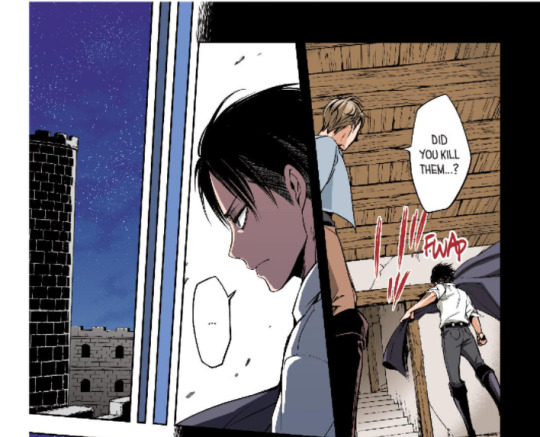
2. Momma’s boys -- definitely a parallel between them in these two shots.
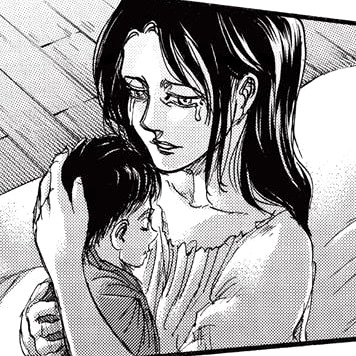

3. Both had to watch their mom die and understand the pain of losing the people they love


4. Parallels between Levi, Isabel, and Farlan, and Eren, Mikasa, and Armin -- both are looking up at the stars and dreaming of something more
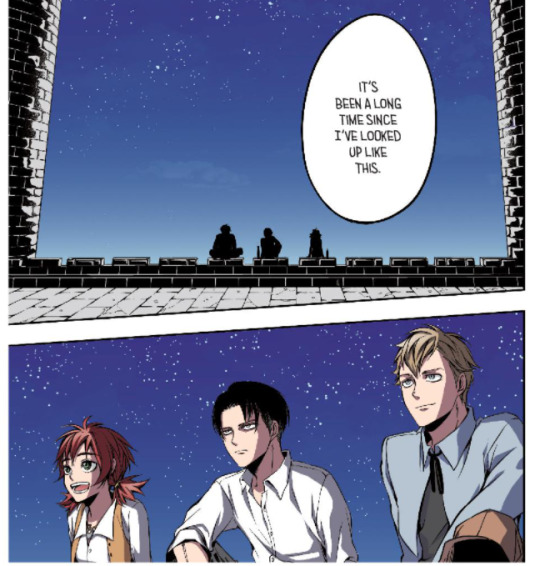

5. Eren has always admired Captain Levi. Just look how stars truck he is 🤩

6.The first time he meets Levi, he sees the Wings of Freedom on his back. The framing of this shot shows that Levi represents freedom for Eren


7. Levi is intrigued and impressed by the fire/determination when he first meets Eren. He is a spark of hope for Levi.
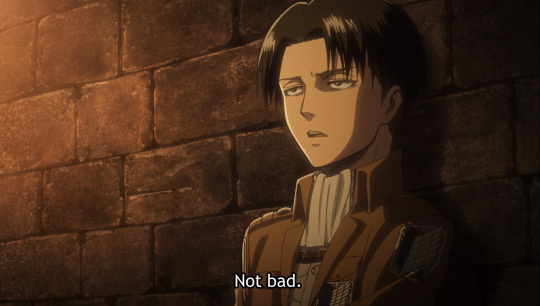
8. Despite many people claiming this scene is ‘abusive’ it is far from it. While it is brutal in nature, Levi’s aggressive display was the only way for him to save Eren from being handed over to the MP. Erwin knew that Levi would need to show the courtroom that he was strong enough to ‘handle’ Eren in order for the MP to give Eren over to the SC.

It’s even explained to Eren after the fact that it was a necessary show of power in order to save him.

It wasn’t something Levi wanted to do -- it’s clear he feels bad about how he handled Eren by asking him if he resented him.
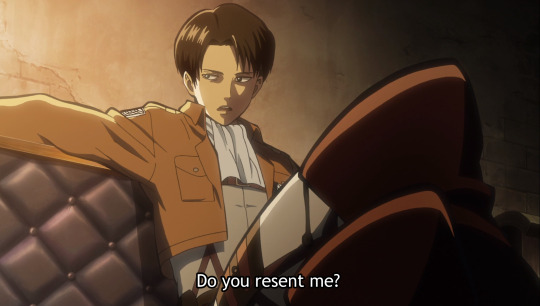
Despite everything, Eren understands why Levi had to do what he did and admits to not being resentful towards Levi, who ultimately appears relieved by that admission

9. They catch each other staring/giving each other eyes 😏 showing that they have an innate interest in each other


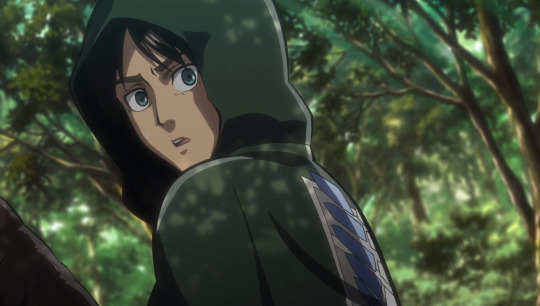
10. Eren is surprised that Captain Levi is so keen to following orders from the higher ups. When Petra tells him about his past, he’s shocked and wonders why Levi would join be in the Survey Corps. Eren definitely shows interest and curiosity in this scene and appears to want to know more about his mysterious Captain
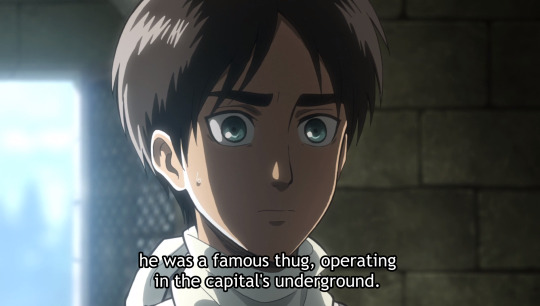

11. They’re super cute together 🥺 Just look at theeeem
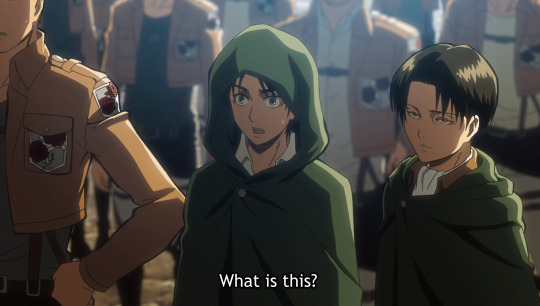
12. Levi is caught smirking at Eren when talking about him being creepy. Okay buddy 😏

13. Levi sees that Eren is a monster and still accepts him anyway. He doesn’t judge or condemn him for being the way that he is. In the visual novel “Burning Bright in the Forest of the Night”, Levi even refers to him as “a beautiful monster”

14. He always gives Eren a choice, allowing him to make his own decisions, and be his own person. He’s only ever encouraged Eren to be true to himself. He’s never tried to change him
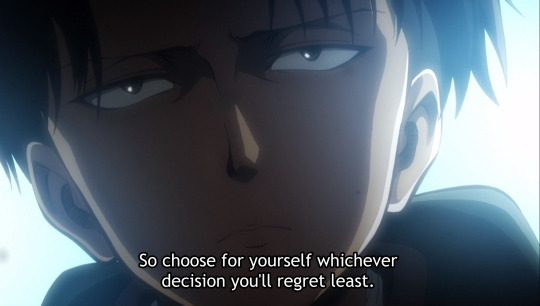
Even when Eren is struggling with accessing his father’s memories and Hange is bombarding him with questions, Levi defends his strange behavior

15. Levi defends Eren based on his “intuition” when everyone else sees him as a monster needing to be put down. Instead, he trusts Eren, standing between him and his squad.
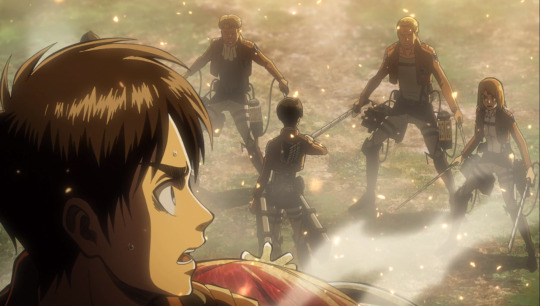
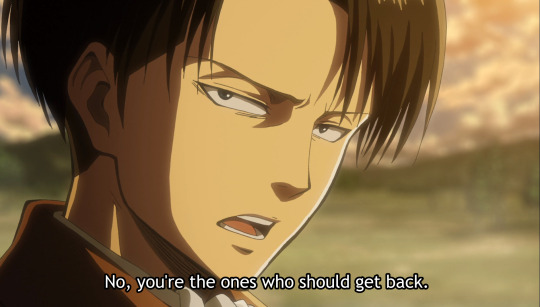
16. Levi visibly panics when he hears Eren transform during the Female Titan arc. He’s clearly worried about him and changes gears to try and save him

17. Levi feels like he failed by protecting Eren and he is visibly distraught when Mikasa calls him out on it.


18. Levi makes up for his failure by only caring about saving Eren, whereas Mikasa seems more interested in killing the Female Titan. He has to talk her down

19. Levi is able to motivate Eren and give him confidence when he’s feeling unsure about himself


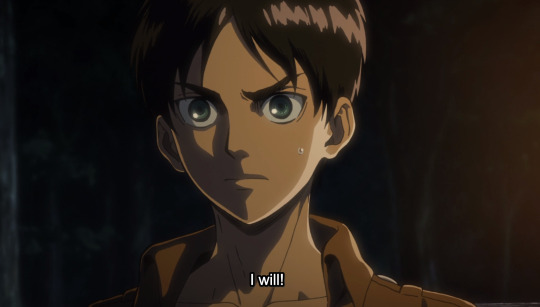
20. Levi helps mold Eren into the person he becomes later in the story. Eren obviously looks up to Levi a lot and learns from him in more ways than one

21. Levi gives Eren the power/motivation to choose again, encouraging him to believe in himself.
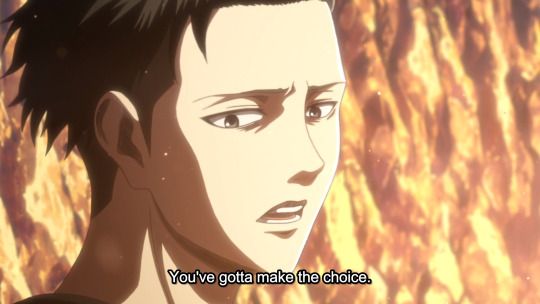

22. They both have righteous anger

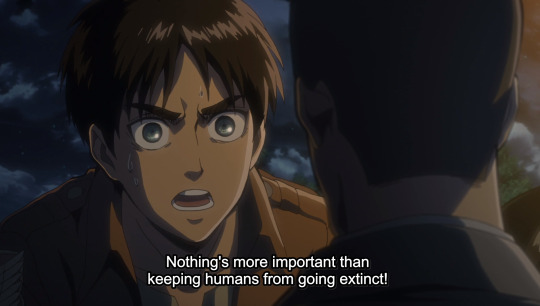
23. Eren is super determined to impress Levi and is visibly upset when he fails to meet his expectations
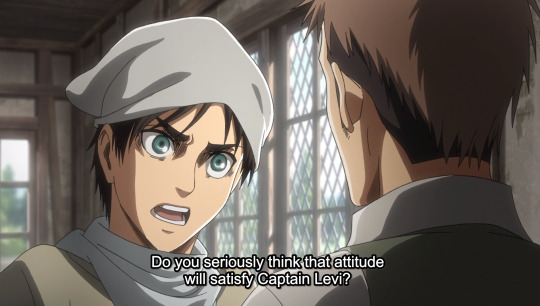
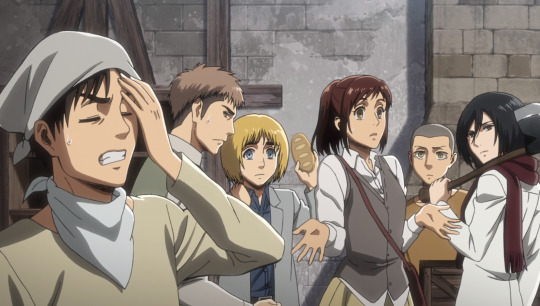

(Just look at the gay panic)
24. Eren unintentionally insults Levi when he calls Rod Reiss a tiny old man. While Levi appears unfazed, Eren visibly panics, clearly showing how much he cares about Levi’s opinion of him
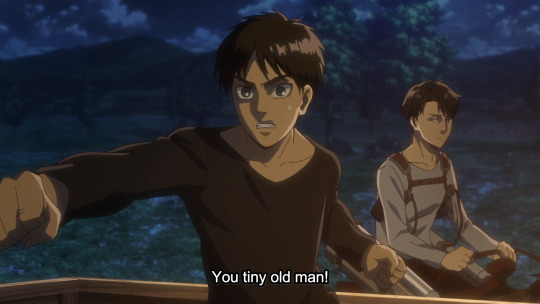
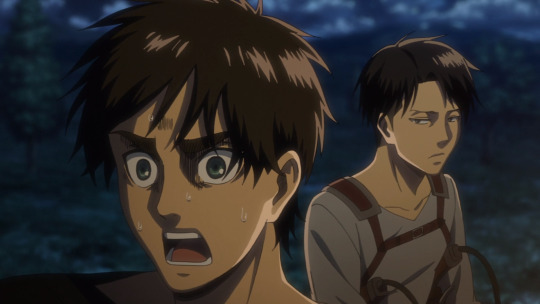
Also I just love this scene. It’s funnyyy
25. Levi shows concern for Eren on more than one occasion
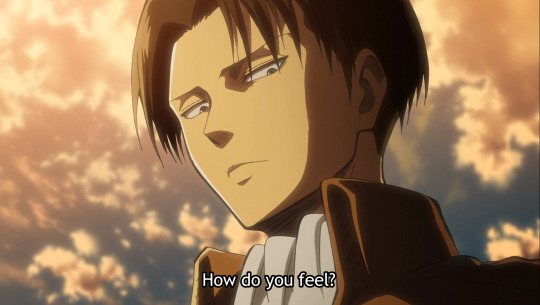
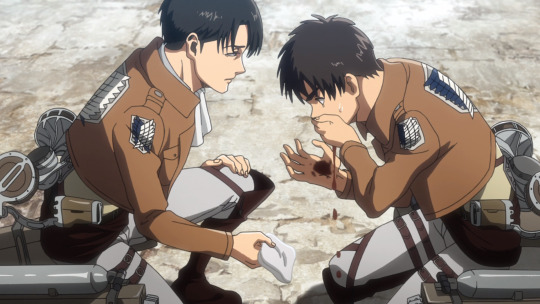
26. Levi has a thing for Eren’s ass... apparently
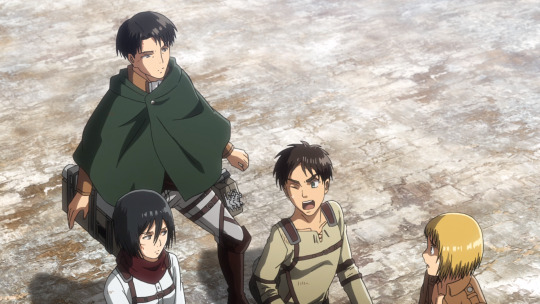
Just casually kicking his butt

and talking about it 😏
27. Eren isn’t afraid to stand up to Levi, despite his harsh exterior. This just goes to show that Eren understands that Levi is more compassionate and empathetic than he lets people believe
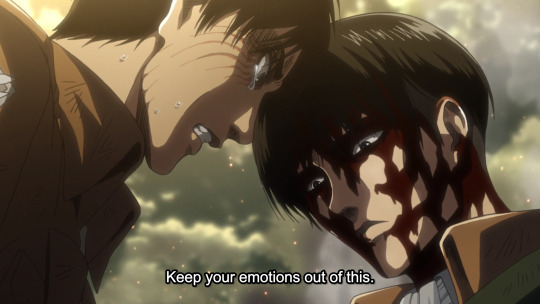
28. While Levi is conflicted about who to save with the Titan serum, he ultimately picks Armin.
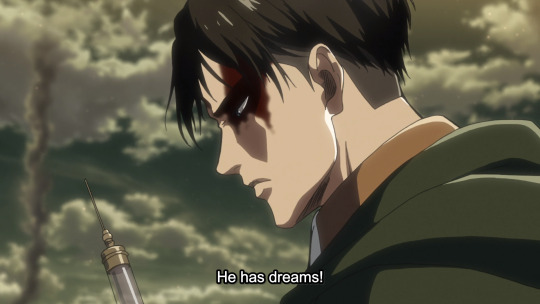
One of the reasons he choses Armin is because of what Eren says about how Armin is good and has dreams, which reminds Levi of the moment that they sat under the stars and talked about the ocean. Levi shows compassion for Eren and his friends

29. Levi gets upset when Erwin tells him to protect the horses instead of Eren

30. Even after losing his best friend, Levi comforts Eren and his friends, letting them know that he does not regret his decision, encouraging them to not regret it as well. Despite being in pain himself, he’s a pillar of strength and comfort for Eren and the others

31. Levi is sympathetic towards Eren’s situation after the Battle of Shiganshina and lets him out early despite his insubordination

32. Levi is disappointed in Eren after what he did in Marley and shows just how upset/affected he was by him leaving by kicking him on the airship. The scene feels very personal and while I could go on and explain why I think it’s incredibly meaningful for their relationship, snkception does a great job of explaining it. You can read their full post here
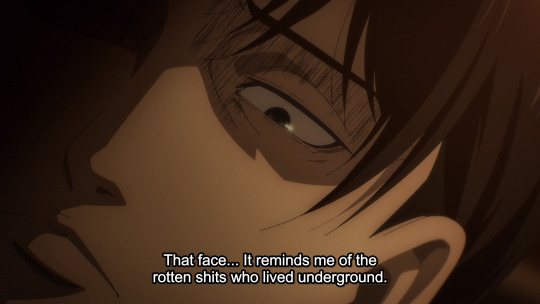

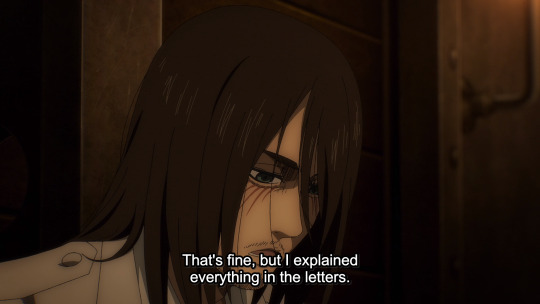
33. Levi is a protective boyfriend
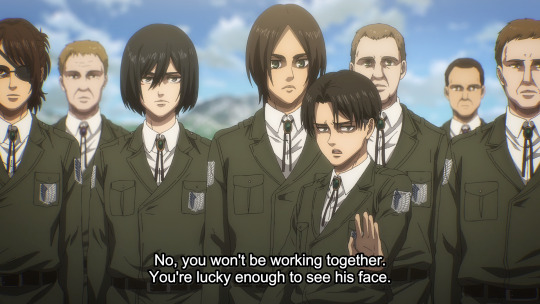
34. When Eren keeps an important secret, Levi tells them they’ll talk about it later. There’s something incredibly personal about the way he says it that implies it’ll be a private conversation amongst other things

35. Their height difference though 😍

36. Levi is obviously important to Eren, since he shows up in his memory shards
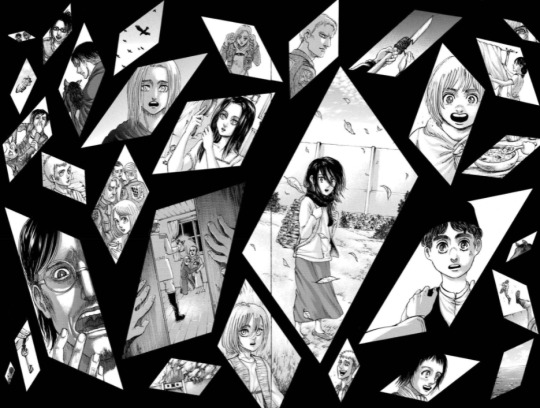
37. Levi is visibly upset when his fellow soldiers talk about feeding Eren to someone else. After everything they’d been through, that’s the last thing that Levi wants.

Also, I think it’s important to note that when Levi remembers Eren, he doesn’t remember him as a monster, despite calling everyone talking about him that way. He remembers Eren the first time they met, when Eren was helpless and merely human
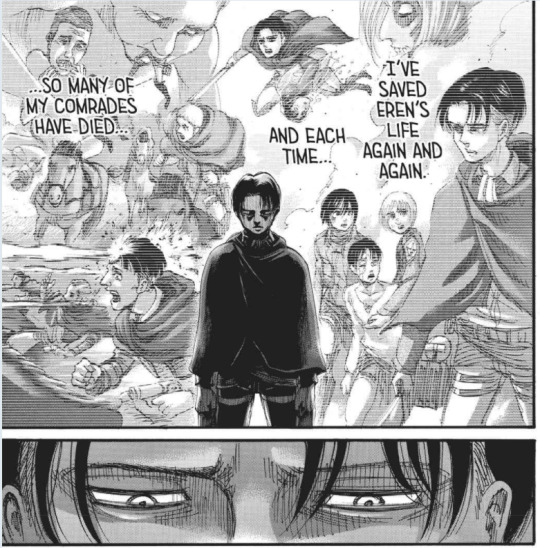
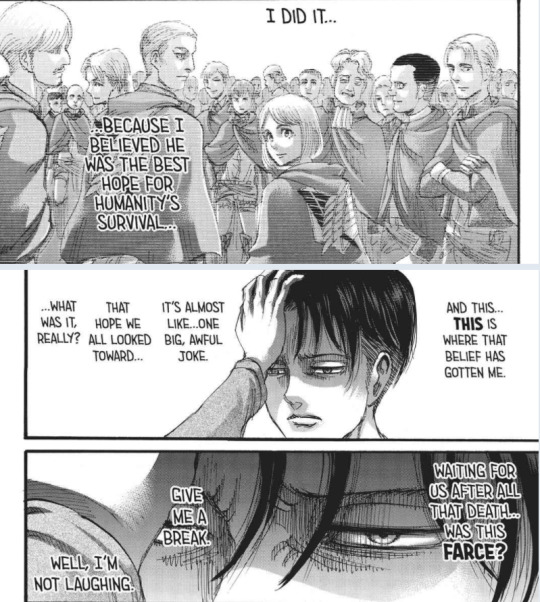
38. Despite his promise made early in the story to kill Eren if he ever went rogue or lost control, he tries desperately to come up with another solution, anyway out of killing Eren
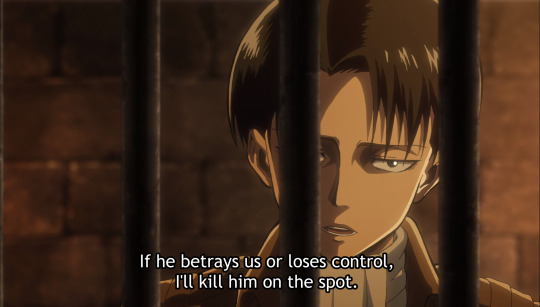

39. When they realize that killing Eren might be the only way, Levi is visibly distraught

In paths, he is the only one on his knees, he’s so tired, beaten down, and lost over what to do that he’s unable to stand and hold himself up on the airship
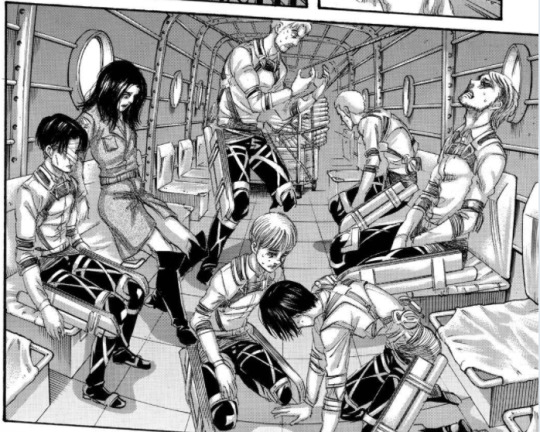
40. There was so much that Levi wanted to tell Eren... what it was, I can only speculate. But something tells me he wanted to tell Eren everything, including his feelings for him

41. Lastly, they’re opposites. The sun and the moon, summer and winter, fire and ice, yin and yang. Eren is fiery, energetic and passionate and Levi is cool, calm, and introspective. Their dynamic is truly beautiful and I genuinely believe Levi is one of the few people who understand Eren completely and accepts him without judgment
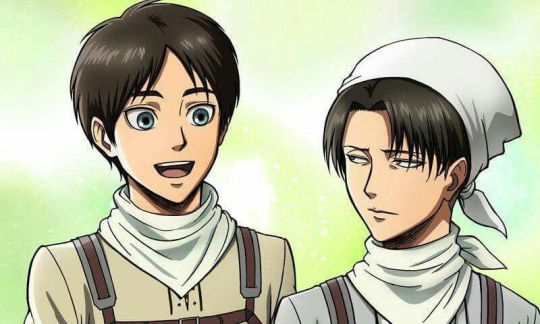
#ereri#aot#snk#spoilers#levi ackerman#eren jaeger#attack on titan#shingeki no kyojin#eren x levi#i love them so much#riren#snk manga spoilers
314 notes
·
View notes
Text
Theo Raeken, Scott McCall and the concept of betrayal in friendship - a Teen Wolf meta
Recently I came upon an interesting and somewhat subversive perspective on two phenomena that have been occupying my mind for a long time – friendship and betrayal. Because these two themes are not only often present in Teen Wolf, but are at the very core of season 5, I had some thoughts on the psychological concepts of friendship and betrayal in relation to the series.
General consensus in our view on both friendship and betrayal suggests that we tend to view friendship as a natural state of things developing through mutual trust and loyalty with love at its core, whereas betrayal is viewed as disruptive event that causes mostly pain, confusion and destruction. The perspective I am talking about considers the possibility that "the roots of both [friendship and betrayal] may draw their energy from the same deep layers of the human psyche" (French, Gosling and Case, 2009) and that betrayal is in fact not something that comes out of nowhere and disrupts friendship, but rather precedes it and constitutes its inherent part. It also introduces a very interesting concept of "virtuous betrayal", which may be regarded as "betrayal in the service of a higher purpose‟ (Krantz, 2006). Both betrayal and friendship are therefore complex phenomena, which according to the authors are interdependent and have deep impact on each other.
I'm going to start from the concept of virtuous betrayal, which to me is interesting and rather uncommon and puts Theo's attempts at dismantling the McCall pack in a new light (at least to me). In Status Asthmaticus (season 5, episode 10) Theo fully reveals the motivation behind his actions:
I never lied about why I came to Beacon Hills. I'm here for a pack. I came for the were-coyote. The one whose first instinct is to kill. I came for the banshee. The girl surrounded by death. The kitsune, the beta with anger issues, I came for Void Stiles. That's the pack I want. Unfortunately, it doesn't include Scott.
What we see here is something which may be regarded as a fundamental difference in Theo and Scott's understanding of what the pack and friendship as the force that binds it means. Scott's understanding of friendship has its roots in the concept that Aristotle called vera amicitia or amicitia perfecta, a 'disinterested friendship', where the well-being of the others is of primary concern, and he is ready to make sacrifices he considers necessary (for example, his willingness to join Deucalion's pack of Alphas, knowing that there might be no way out of it once he agrees). Meanwhile Theo regards the pack mostly in terms of power and safety, where the element of friendship is non-existent. In his speech, he emphasizes only traits which are mostly viewed as negative, which is very revealing when it comes to his understanding of the world and its rules. He genuinely believes that removing Scott from his position as the pack leader is for the greater good; to him, friendship, love and caring that constitute the basis of Scott's pack are all weaknesses. This is the result of his formative years spent under the 'care' of The Dread Doctors and the values instilled in him, which are the exact opposite of what Scott believes in. Theo views the pack and leadership through the lens of utilitarianism, "to the exclusion of the pursuit of virtue and commitment to the good" (French, Gosling and Case, 2009), which is the complete opposite of what Scott believes in. He knows the Doctors' main goal – unleashing of the Beast of Gevaudan – and wants to get out alive; his main goal is survival. It is worth mentioning that he also operates from the point of a deeply rooted inferiority complex ("I'm not even a real werewolf"). Therefore he believes that what guarantees him survival and safety is securing his position as the leader of a pack by fear and control instead of mutual trust and loyalty.
This perspective raises the question of the degree to which he can be held responsible for his actions. I tend to disagree both with the view according to which Theo is considered only a victim, as well as the one which considers him only a "bad guy" without taking into consideration all the mitigating circumstances surrounding the way he was raised. We all act according to the values imprinted in us in early childhood, which shape the lens through which we view the world. Therefore, I deeply disagree with the view that Theo 'deserved' whatever happened to him. Of course, he does have the ability to make choices, and it doesn't excuse the bad ones he made (for example killing Josh and Tracy). However from his perspective, all the choices he made were necessary for both his survival and his attempts to feel whole, to be a real person instead of an artificial construct he perceives himself to be.
How does this relate to theory I mentioned above, which considers betrayal not only a fundamental part of human experience, but an inherent element of friendship, which in fact inevitably precedes it instead of outside force that disrupts it? Well, at this point it became obvious to me that this is exactly how Theo perceives the world. According to James Hillman and his reflections on betrayal as viewed through the myth of the Garden of Eden, betrayal is a natural and necessary stage in the „unfolding‟ of human consciousness (Hillman, 1975, in: French, Gosling and Case, 2009). Through betrayal, our real self is born, as it was depicted in the myth of the fall of Eden, in which the "death" described in Genesis – „of the tree of the knowledge of good and evil you shall not eat, for in the day that you eat of it you shall surely die‟ (Genesis 2:16) – means the death of illusions that we as human beings like to hide behind, for example perceiving people as either good or bad without understanding that humans are complex beings with different motivations and initial circumstances that formed them. In the case of Theo, he was already put at a deep disadvantage comparing to the rest of the pack members and had no chance to develop positive and healthy values and coping mechanisms that would enable him to earn what he desired instead of taking it by force, which was the only way he knew for his whole life. Again, that doesn't in any way negate traumas and hardships the other members of the pack went through, neither excuses Theo's behavior and the choices he made. I'm simply pointing out the factors that were a huge part of why he did what he did.
Now, let's get back to Scott. It's interesting to me that Scott, despite the fact that this view of the world and the values he believes in are very different than Theo's, seems to understand his motivations, at least to some degree:
Scared people do things you wouldn't believe. (season 6, episode 12)
Life can’t ever be all bad or all good. You know, eventually, things have to come back to the middle. (season 5, episode 1)
Especially the second quote (regression to the mean theory) is interesting, because to some degree it agrees with Hillman's theory about betrayal being the necessary part of evolving human consciousness and the 'death' of illusions that humanity develops to avoid facing uncomfortable truths about themselves (such as Stiles rejecting the 'shadow' part of himself which then manifests as the Nogitsune). Scott's deeply empathetic and caring nature explain his enormous ability to forgive things that most people would consider unforgivable, which is reflected in the scene of his death:
SCOTT: They're not like you. They never will be.
THEO: Because I'm a Chimera? Because I'm not a real werewolf?
SCOTT: Because you're barely even human.
Barely even human. Even in his darkest moment, as he is dying at the hands of his former close friend and now his greatest enemy, Scott refuses to fully dehumanize Theo. He doesn't call him a monster. He doesn't hurl insults towards him. He still considers him a person. In fact, he never in the course of the whole show acts hostile towards Theo or mistreats him, not even once, although he would have plenty of reasons. The main emotion he expresses towards Theo is deep disappointment. He doesn't even express regret in having trusted Theo. He decides to trust him again by sending him with Mason to the tunnels and by asking him to get to the hospital to take care of his friends, which – if this trust was misplaced – could have serious consequences.
Although perspective on betrayal as a fundamental part of human nature inevitably connected to friendship may seem somewhat pessimistic, it may also seem the opposite. "In our heart of hearts, we carry both experiences together: they coexist, so that if one is dominant, the other is always present as a 'shadow' (French, Gosling and Case, 2009)". From that perspective, we can understand the necessity of forgiveness more deeply and be ready to work on and develop our ability to forgive, which can in time become our greatest strength instead of our greatest weakness. Just like in case of Scott McCall, who – by forgiving the unforgivable – made his enemy, the man who betrayed him, turned his friends against him and murdered him, into his trusted ally.
46 notes
·
View notes